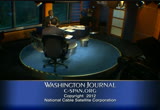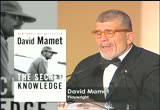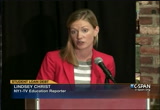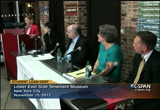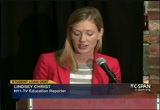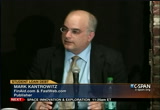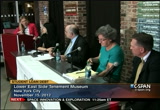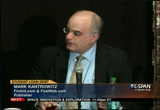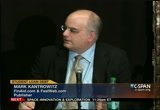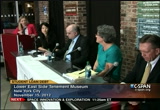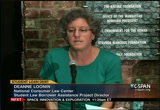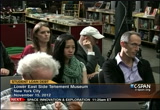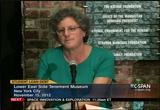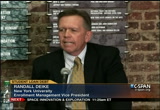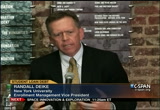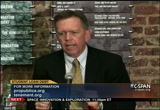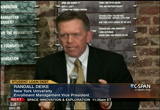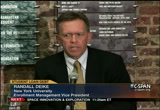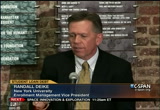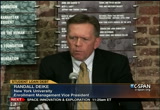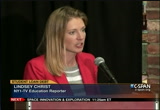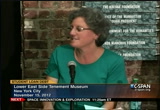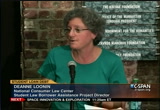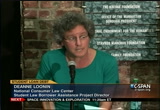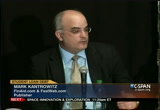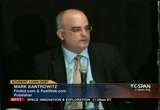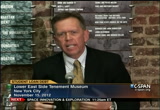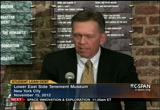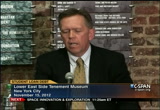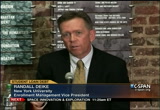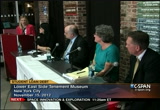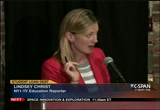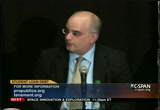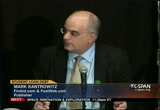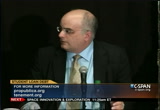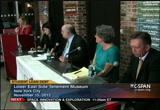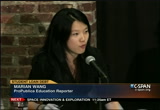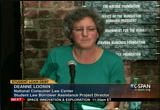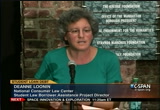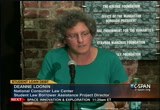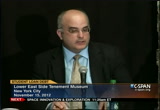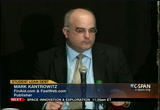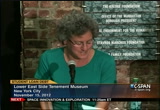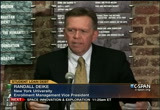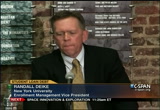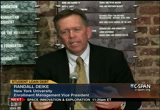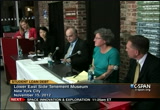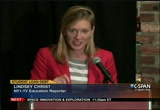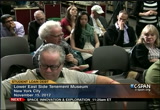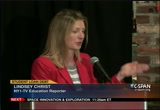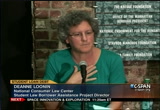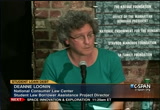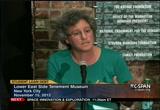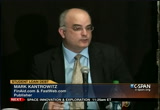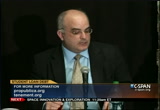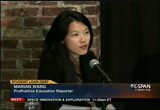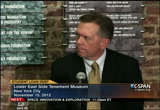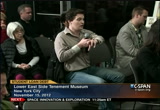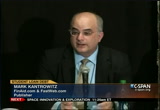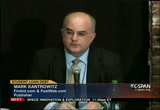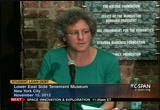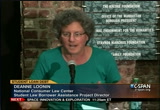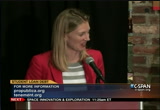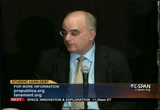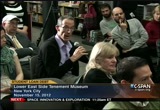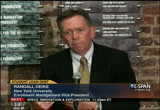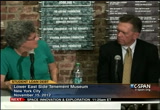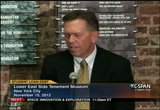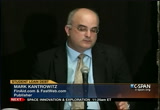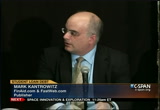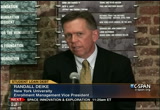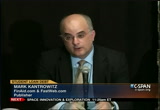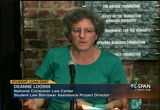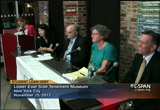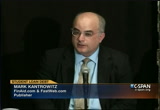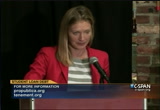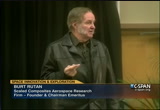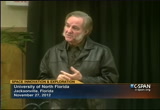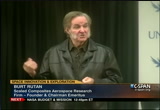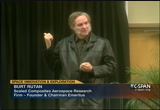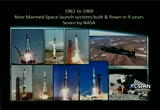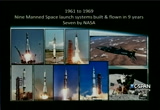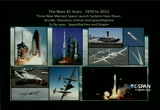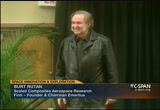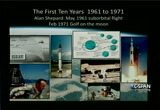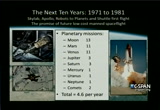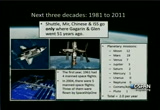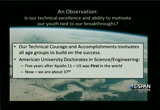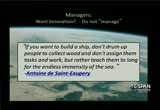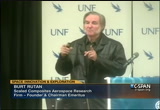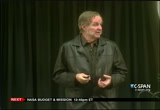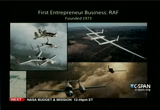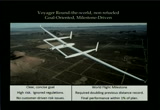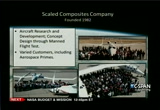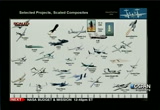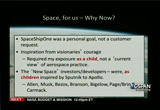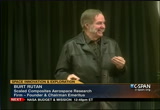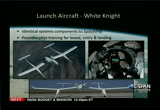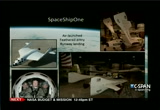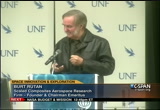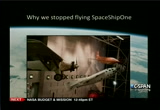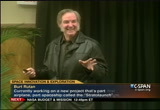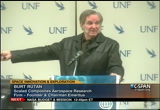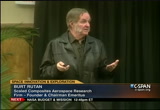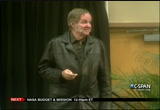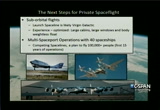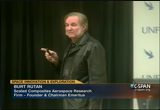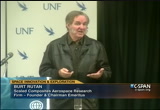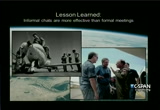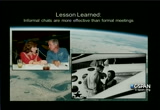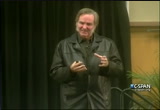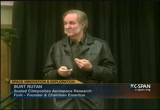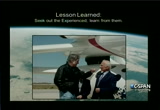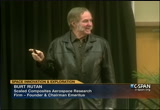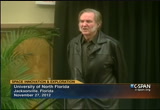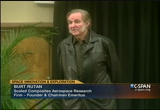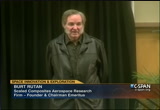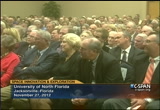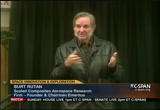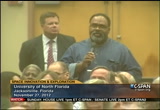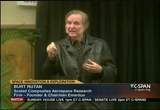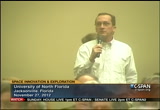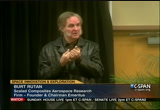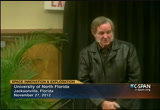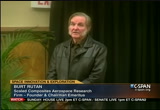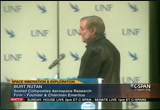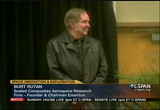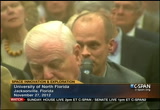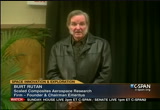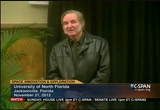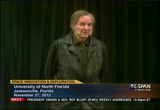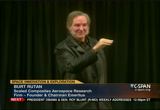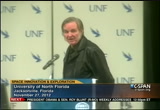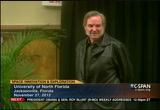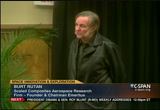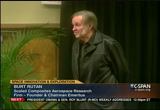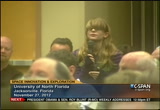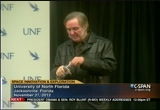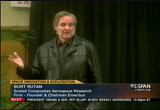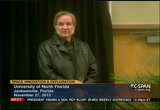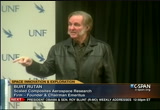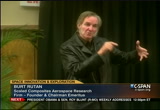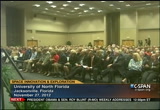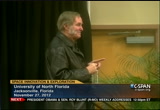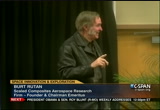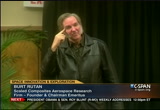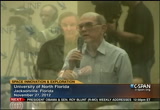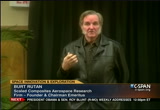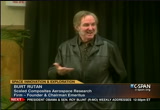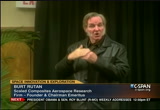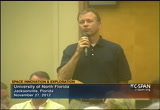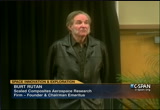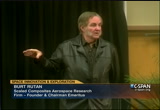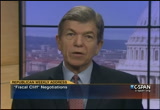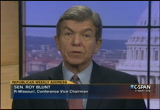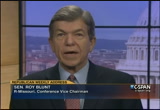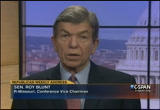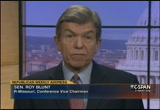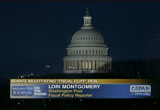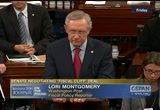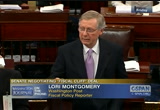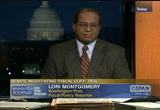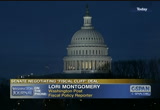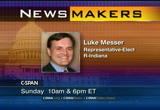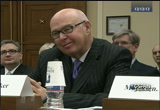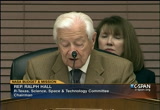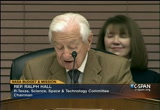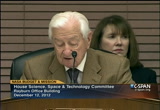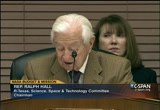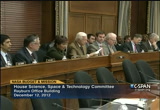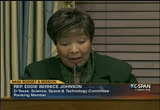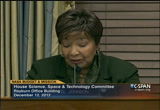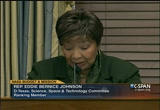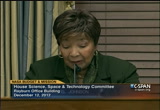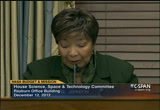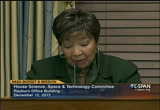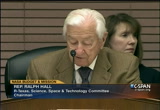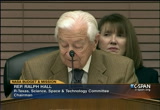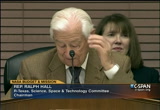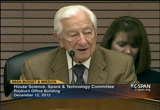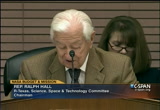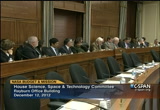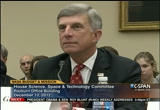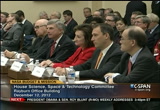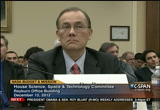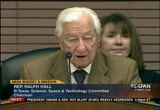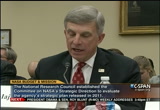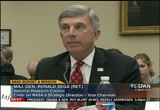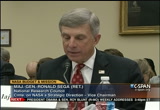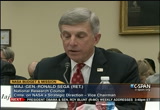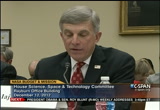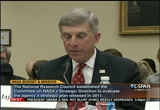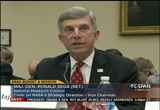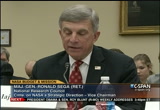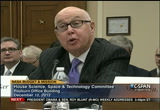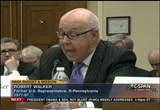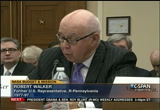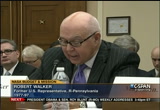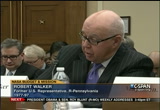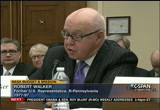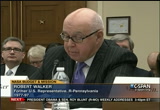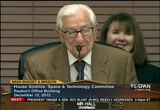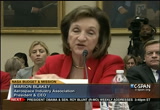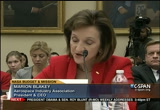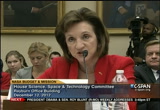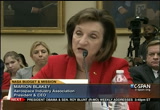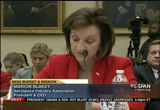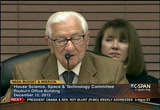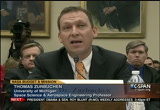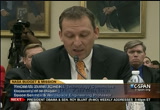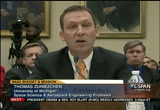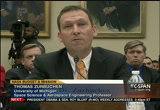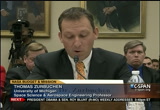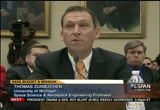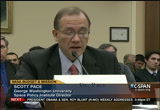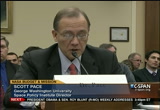tv Washington This Week CSPAN December 29, 2012 10:00am-2:00pm EST
10:00 am
we will talk about the latest on the so-called fiscal cliff. we continue with david jackson, a white house reporter. we will talk about president obama's cabinet for his second term. we will wrap up the program with michael gordon talking about what is next for iraq. thank you for watching this edition of the "washington journal." we'll see you again tomorrow morning at 7:00 eastern time. [captions copyright national cable satellite corp. 2012] [captioning performed by national captioning institute]
10:01 am
>> today on c-span, the impact of student loan debt on students and parents, followed by a look at space exploration and innovation. later, a discussion on nasa's budget and mission. >> my first conservative was a friend of a friend -- i never met a conservative in my life. i was impressed by him, because he answered questions, he was very composed. he was not rancorous. he tried to gauge his responses to the level of my request. over the course -- and not understand of anything this guy is saying, but he is so damn polite. maybe there's something in his convictions. >> playwright and reformed the mamet.al david
10:02 am
sunday night at 11:15 eastern. "booktv." >> according to a report, the u.s. now has more student loan debt and credit card debt. next, a discussion on how to ease the debt burden on students and their families. hosted by propublica and the lower east side tenement of new york city. [applause] >> with a degree comes student debt. i'm really happy to be here tonight.
10:03 am
it is great to take some time, to have this many and this whole set up to discuss these things, and these issues. i think propublica does a fantastic job with this, as they do with everything. we are happy to have a fantastic panel with the array of experts you would want to be discussing this issue. marion has been covering this for propublica, and a month ago had a fantastic piece that would-be the result of months of investigation of the debt burden on parents.
10:04 am
that is an aspect that not a lot of people have been talking about. although you may have read about it on the cover of the "new york times" today, a month ago is when she began talking about it. we have the publisher and author of a best seller called "secrets to winning a scholarship." next to him, an attorney with the national consumer law center and the author of several publications including "student loan lot," and "the guide to surviving student debt." next to her is the n.y.u. chief enrollment officer. he is in charge of the office of financial aid. so, to get into the solutions oriented discussion we're going to have today, the problem is something i think everybody is very familiar with, but i think sometimes google's of the sale is an interesting harbinger. if you type in student loan, it will suggest student loan forgiveness.
10:05 am
if you type in student debt, it will suggest student debt crisis. this is a problem many people worry about, whether it is at 3:00 a.m. when they cannot sleep or in the hospital staring at their new baby and wondering, how will i do this the way i want to, the way maybe my parents were able to manage in a previous generation. the average student graduates with $26,600 worth of debt and over 13% default within three years. we have more outstanding student at than auto or credit- card debt at this point. many may think it is good that we have more student debt than credit-card debt, but not if we are not able to pay it back.
10:06 am
the current job market and the great recession have made it much worse. i want to have maryann talk about her incredible investigative work into how this affects parents. first of all, what are the biggest concerns without population about this debt, and what are the potential solutions for the parent's side? >> we chose to start with the parents because the federal loan program for parents to borrow through to pay for their children's education. people say that federal loans have card caps of $5,000-$7,000 per year. you can only borrow a total of $33,000 for undergrad.
10:07 am
but that is not looking at the parent portion of the picture. the parent portion allows you to borrow as much as you need, to fill the unmet need, to pay your child's way to get to a particular school. there is a credit check that is very modest and there is not a check on income. but as costs have grown, perhaps the limits we have had on federal student loans do not meet the needs the students and families are experiencing when they are trying to pay for college. you see the growth in the program where more parents are
10:08 am
borrowing from this program. recipients have doubled in the past decade, and they are borrowing more money as well. we thought it was emblematic of the shift in the system. >> would you say the apparent lack of paycheck is one of the most consistent missing pieces? if someone has an income of $10,000 a year, they can take out a loan for $30,000. >> if they do not have a negative credit history, and we could have a larger conversation about how that is defined, you could borrow much more than you make in a year.
10:09 am
>> mark, why do think people are taking on so much more debt than they can handle? >> the burden of paying for college has shifted from the federal and state governments to the families. the only type of financial aid that has elasticity is the loans. stafford loans have limits. parent + loans have no aggregate limit. it has nothing to do with the family's ability to repay the debt. the second aspect is the students and parents are chasing the dream, and they will sign whatever piece of paper is put in front of them without paying attention to the details. they figure they will figure out
10:10 am
how to deal with it after they graduate. there are ways to reduce your debt such as attending and in state public college or a college with generous financial aid policies. that is one of the most effective ways to do that. once you're on campus, you can buy cheaper textbooks and sell them back to the bookstore. but that does not do as much as just going to a less expensive college. >> is the chasing the dream aspect something that in previous generations was possible and able to figure out after work, or is it in knowledge gap in terms of things have changed? why is it more of a problem now, or is it not?
10:11 am
>> the debt has grown. when you have a failure of grants to keep pace with the college costs, there are three main ways families deal with it. one is to attend a lower cost college. one is to not go to college. the third is to graduate with more debt. we see this manifesting itself first and foremost on lower income students. even though college enrollment as a whole has increased, there has been a shift in undergraduate enrollment among low-income students from bachelor degrees to certificate degrees. a good rule of thumb is that your debt at graduation should be less than your annual starting salary. if it is, you will be able to pay it back in 10 years.
10:12 am
more and more families are graduating with an affordable that. given that they do not have an awareness of what it means to take on this debt, and no one is teaching them financial literacy in high school or college, smart borrowing is something they are not able to do. someone who is getting a bachelor of science in nursing can afford to take on more debt than someone getting a degree in religious studies or a low income field. it does not mean you should abandon the degree. it means you should pay attention to the debt, because you may abandon the dream later. >> not all degrees are worth as
10:13 am
much is something those of us who love liberal arts in the united states have a hard time coming to grips with. >> or journalism. >> is -- it obviously makes people uncomfortable that the situation is further curtailed by the family were born into. if you are a wonderful high school student, you have to think more about your major and your college than a student born into a wealthy family. how do you balance that with the reality of this crisis. >> one of the things we do at the national consumer law center is direct representation of low-income borrowers as well
10:14 am
as speak to thousands of borrowers throughout the country. we do see the effect of this threw out the country. many students do not graduate. there is default. when you think of who the loan borrower is, the majority fall into nontraditional student categories, meaning 25 or older, often financially independent, often have their own families, so just to have that in mind. the problems of four year traditional students are important, but i think they get disproportionate attention.
10:15 am
i have clients in their 30's, in their eighties and in their nineties as well. this is a problem that lasts a lifetime. one thing to sort of answer the question, a lot of this depends on what we think the goals are of our federal aid policy. i think that is something we can debate a little bit, because historically, the main goals of the aid policies were about social mobility, equal access not just to get into college, but to complete and hopefully succeed financially and help with social mobility issues. looking at that goal, our policies have been a failure.
10:16 am
the social mobility part of higher education has not changed much in terms of what family you are born into and what your odds are of going to college. one solution i throw out is that i do not think we should be limiting opportunity at the front and so much. i think people when they make decisions are not just chasing a dream. this dream is sold to us from the beginning. college credentials to impact your income. we all make decisions with an optimism bias. we think we are the one that will succeed. the problem for my clients is not that they make worst
10:17 am
decisions, it is that the consequences of their decisions is so much worse. it is not the level of debt. it could be a small debt that spirals for a client. we should not leave people out to see who is going to succeed. we should not hammered people so much if they get into a little bit of trouble. we do not give people relief. we go after them forever. let's give people the opportunity to go back to school again. that is good for taxpayers too because they're more likely to repay their loans.
10:18 am
>> nyu is used as an example in many of these stories because it is a sought after school. you say you are uncomfortable with the parent plus program, but you rely on it like other schools. how has nyu been developing policies both from the admissions standpoint and to help students once they get there and end up in trouble? >> first, a little context. i will answer your question. i do not want to sound like the person who will push this under the rug and say student debt is ok, but context is important.
10:19 am
the disparity is huge as you look across this issue. we talk about a 13% default rate. it varies from 1% at some institution to 40% at others. it is a broad set of issues. i still described as a crisis. what is our definition of a crisis? i am not going to answer that. i think the context of a crisis, and the dilemma is, how do we find the talented student -- and just so you know, i am a farm boy who has worked at four
10:20 am
different institutions with very different missions and six different university presidents. i'm a lucky person as well. i have seen a broad array of university missions, types of students, profiles of students, and this is an issue across all students, but i do not think it is fair to compare credit-card debt and student loan debt. student loan debt is an investment in the future. there is a payoff, but not to the degree that it puts families and students in a position that will have a significant negative impact on the decisions they make post- graduation. that is kind of the dilemma,
10:21 am
but i think it needs to be framed differently than it typically is. it is the crisis component. everyone has debt over $100,000. that is not true. if you have ever heard john sexton speak, he will say our financial aid is not what we would like it to be. but even at nyu, the percentage of students with that over $100,000 is very small. i do think context is important. that is where i will start. there is huge disparity across different types of institutions. what we have been doing is a number of things. i have been at nyu about 3 1/2
10:22 am
years. we have affected quite a bit of change in that time. john sexton is completely committed to the following. our goal is to inform families right up front, shop around. nyu is a unique place. our value proposition is different than every other institution in the country. we have a global network of campuses. we are in -- i am biased, but the greatest city. we are in greenwich village. we have a world-class faculty. i believe there is a value proposition that is different than other institutions. we are a fabulous place, but we are not the only fabulous place. our message to students from prospect on is about what are you looking for in an
10:23 am
institution, what are you looking for in a program? and remember, about half the freshmen who begin this fall will change their major at least once. what are you looking for in a program? small, large, internship opportunities, faculty? one thing to consider should be the financial investment, not just the first year, but across four or five years. families will cobble together a package, a financial package, that will get through the first year, and then they find themselves in real difficulty. our goal is not to scare people away, and not to be the latest. we are working hard to get the limited amount of financial aid we have to the right students. we're completely need based.
10:24 am
i could count on one hand the number of merit scholarships that are not need based. we are telling families, consider these factors. do not ignore the financial investment. i meet with a lot of families, and they are wonderful people, but the first thing they say to me is i have wanted to come to nyu since i was four. what could you really know about the university when you are four? you might know that you like new york city or that alec baldwin came here. but it is important to consider the financial aspect. >> is that something you are stressing more now than you were a few years ago? >> it is. there were families coming to nyu that did not have the financial resources to be there, and we were not in a
10:25 am
position to provide the resources to allow them to stay. i do not want to sound like we are an elitist institution telling poor kids not to come, but for families thinking about the future, you have to think about the impact this will have in the long term. the other aspect is examining how we invest the budget we have. that is my responsibility. we have made some major changes in how we are awarding financial aid and how we are assessing the financial resources of families. that has been a gain changer for us.
10:26 am
we have fundamentally changed how we are awarding lower and middle-income families financial aid. >> you were saying the college debt is good compared to credit card debt. >> with a qualifier, but yes. >> the major qualifier for that would be that you graduate, that you end up with a degree, that the college that is not a cliff you never end up completing. especially non-traditional students, some are in the single digits after six years. what is the responsibility of the school to help people get to a degree?
10:27 am
i know at a place like nyu, do you expect lots of transfer students, for instance, so that people could do community college and then graduate with an nyu degree? i do not know if any of you have opinions on getting students to graduation and who is there to pick up the pieces when things go wrong in the process. >> i can just say that one thing is -- there is actually surprisingly little research on why people default. we did a study this summer which had a very small survey
10:28 am
sample, but is shockingly one of the few where it surveyed people who were talked into borrowing and asked them what happened. completing is not necessarily going to lead to success. there are some factors, largely in the for-profit sector to some extent, where completion does not lead to financial success necessarily, but in general, completion is important. there are a number of ways across the board that we can do a better job at this. there are some federal and state government requirements to have more information out there about completion rates and other information about schools. information alone, disclosures alone, in my opinion, are never
10:29 am
enough of a consumer protection policy, but they are certainly helpful to some extent. having a consistent way to measure completion is important too. people being able to compare apples to apples is important. two different outcome measures is important. many of you may know that the obama administration tried to start doing that, mostly in the for-profit sector, but not exclusively, and has had a lot of opposition over that. i think we will see more efforts coming in the next four years. the last thing i would say is
10:30 am
what i said earlier, which is that for people who do not complete, knowing that this is a factor that leads to default, that we do not make that the final sentence for everybody. let's make it easier for people to transition out of default, to prevent them from getting into default in the first place. the best way to solve the problem is to help people and of succeeding. if you have better completion rates, you have your people in the problem in the first place. >> the key is getting the student who starts to the finish line. the focus on completion rates has a new ones to it.
10:31 am
one of the easiest ways for college to have good completion rates is to deny admission to high risk students. we need to remove the obstacles that keep students from completing their education. i do not think community colleges are the solution. community colleges are great if you are seeking an associate's degree. but of those who starred at a two-year institution, 20% graduate with a bachelor's degree from an institution where you go for years. two-thirds who starred at the four-year institution finish there.
10:32 am
to the extent they are relying on debt to make college more affordable, they need the evidence to back it up. if the students were to hear that two-thirds of the students from this college or going to graduate or drop out with more debt than they can afford to pay, they might walk to a college that is less problematic on equal measure. but what is needed is not just federal disclosure of affordability. the financial aid shopping sheet is a step in the right direction, but better disclosures are not enough when students and their parents do
10:33 am
not have the skills to interpret these disclosures. a better financial literacy needs to be taught in the secondary school curriculum. it is not as to the making smarter borrowing decisions, it is also about helping them be more successful. it is a guide to being a grown- up so that you know how to save for a house, prepare for children, save for retirement, save for your children's education. nobody teaches them that and they need to know that so they can make informed decisions. they need those skills. >> i was just going to add that i do think at the department of education level they are trying
10:34 am
to push the consumer information angle and to have colleges have those tough conversations without the department having to come down and actually put a hard income limit on something like a parent plus loan. they want that to happen on the counseling level. when i talk to financial aid administrators, they are conflicted about it sometimes. who am i? is it my schools place to say that this is too much money to borrow? >> i would be happy to speak to that. there was an article right after that expressed that specifically. counselors are not financial advisers. we do not know what the financial resources are. we know that they have additional information out there.
10:35 am
it is our policy that we are not doing any financial adviser in. this is a loan, you have to repay loans. we are not qualified, nor should we be making decisions for families and telling them that you can't come here because you can't afford to be here. additionalow what resources they might have. i have had conversations with families where you need to consider carefully what this is going to mean long term. you need to have talks that will not result in a kind of that you're going have. short of saying not to come here, they need to think carefully about where they're going to be.
10:36 am
let's talk about completion. my background is psychometrics and statistics. i understand standardized testing. we make decisions in the more selective institutions based on a set of characteristics. but we are not perfect at it and there are students that we got, the students that succeed at nyu and they're going to other wonderful colleges. i have worked with the school district, a guidance counselor has 600 students assigned to her. they are not getting any really good school counseling. should they not have an
10:37 am
opportunity to attend college? for many of those students, their first opportunity to see whether or not they are capable of doing college level work is if they enroll in a community college. if they are not able to do the work and they are borrowing, they are saddled with loans that. i am glad that mark mentioned secondary schools. there are huge issues in large school districts, especially, related to family is getting good information, and that out -- is critical solving a lot of these issues. it is not a snap your fingers kind of solution. they're very strapped in terms of resources financial and human. it is broader than retention
10:38 am
strategies. how do we start the conversation early enough that families and students understand what the expectations are? it is a broader and more complicated mission. >> a perfect segue that i wanted to talk about next, the role of government in all of this, talking about how schools and families and the government can do a better job helping to alleviate this issue for families. one role that the government has is the public-school system. i think the one aspect we have not touched on is the number of students, especially from lower performing districts, and the
10:39 am
number of students that graduate and they needed remedial work. they end up using a lot of their loans taking high-school class's, they have gone through and they are already in debt. that is a big issue in new york city. that is one huge problem. we also briefly touched on the federal government's role in regulating this whole process and how the push seems to be for disclosure, more information out there will help people be better consumers. the third issue when it comes to the government is the caution that mark issued, the state and the city universities have been defunded over decades, and that as part of the rising tuition costs.
10:40 am
a public university level that -- i read once that every time there is a financial crisis, they cut university's first that they never put that back when the economy rebounds. we have had tuition rates go way up. in terms of the government, all those different roles that they apply, how much of this is a problem that the private sector and individual families are not as much to blame for. >> there is plenty of blame to go around. we have kindergarten, before kindergarten, and at the college level, someone graduates -- someone who graduates is twice as likely to go on.
10:41 am
the debt is having an effect on people's choices, like it or not. a government is responsible for it. there is the failure of grants to keep pace with college thoughts. the government is also responsible for the failure of the grants. the other side would like to blame the cost, but i think it is both. those are very interesting aspects. you have students on average having as much, and it is completely skewed towards the funds and it has been -- the way we have a $15,000 program.
10:42 am
that would lead to hundreds of thousands of additional bachelor degrees. the grant pays for itself in the decade. that increased federal income tax rate, it pays for the cost of the po grant. half of the students are not traditional students, but the half that are, they have a typical work load. yet 10 years to pay back the government for the cost of a grant. then there is a 14% return on investment. it is not as much of an advance from the federal government. we should stop thinking about this as being purely a personal benefit to the students. and there is all sorts of good that comes from higher
10:43 am
education. there is a lot of good that stems from a college education and as a society, we should be putting the highest possible priority on it. we get what we sow, and you need to be thinking about where we want our society to be in a few decades, and the way to that, and ever improving society is through education, not cutting the one thing that is a real investment. >> another thing i would say, i will give you an example from a
10:44 am
parent loan situation. if you get a client, you fail this credit check. you get about $4,000 extra in student loans. i hear this from administrators a lot, a lot of people are hoping to get denied that they can get the extra $5,000 because that is what they need to pay their way to an in-state schooler something like that. it is a weird thing, if someone is applying, hoping they can get denied, if that is all they need, should be limits be reconsidered? do they shore up increasing grants? is that something the federal government could or should consider? most of federal student loans,
10:45 am
student borrowing is happening through the government, of course. we haven't gotten too much into the private loan conversation which we could, but you have these federal loan services that are handling all of this loan revenue. the system is not -- a communication breakdown between the borrowers, servicers and lenders resemble the mortgage market where people fall under hard times and they need a little more flexibility. the amount of paperwork and bureaucracy that stands in a way of relief is something that i think the federal government could and should take a more active role in overseeing >> i
10:46 am
spend a lot of my days hanging my head against the wall with the department of education and it has huge costs. administration of the programs themselves is a very important topic. getting back to what i said originally, if the goal of federal aid is about social mobility, i think we have to realize that the government policies, they are going to have to be targeted that way. he talked about the need-based aid, it is a way to have hit more targeted. and i think having a conversation about if higher education should be the driver
10:47 am
in this country, a lot of people frank, i am not an expert on this that all, the people that are in trouble,-there could be alternatives to college that could lead to some good-paying jobs, a cheapening of the credentials, more people have the have college credentials for entry jobs, it impacts lower income individuals as well. that is an important conversation but it is a main driver of mobility. excepting that premise, we should have the targeting go that way. and the 2nd think, again, giving people a break on the back end like i have been talking about is not just about cutting back on some of the draconian policies, but it is what mary and is talking about,
10:48 am
making sure the programs of their home actually work. that is the government accountability issue which i think has gotten attention in a very polarized away. it is somewhere in between. my experience working with the department of education, for the most part, the tensions are good. it drives people near profit. it is what is right now. and there are benefits of that.
10:49 am
>> the example of $10,000 of and come and $30,000 of debt, either they are not aware of what that means, for there are expecting the child. i say we get rid of alone and have a rational set of limits on the student loans based on the degree lovell that will specify what the likely in come as going to be. the annual limits of will be
10:50 am
proportional. i think that we need to do more on the back end. we'd have a bankruptcy discharge available. we need to restore a statute of limitations. i see many examples in which the loan records are computer printouts and there is no copy of the promissory note. the lender denies it, and records from 30 years ago are often hard to come by. i had a senior citizen approach me that said i could not borrow those loans because i was incarcerated.
10:51 am
proving that he doesn't own the loans, he has to, not only under the rules, he has to state that someone else forged the signature, but he has to have been caught and prosecuted for him to get one of these false certifications. that is almost impossible to do. we need to attack this from every angle. >> in the province -- in the public good model, the government funded most of it. 73% of the operating budget came from the state.
10:52 am
10:53 am
the comment about setting loan limits based on earning potential makes sense, but we know that students change their minds and you could be premed the first semester at a journalism major in your second. >> i started engineering, so i think there has to be some method by which we are limiting loans, but this is not a novel idea. if i were king, which i am not, i would put all of the grant programs and loan programs in one place.
10:54 am
it would be in come based repayment. there are all kinds of problems that would need to be worked out. i happened to be in london when they did this model. students were amazingly concerned about the potential outcome. but it is of much more equitable model. politically, it is incredibly difficult, but the problem of front is that we don't know, people are actually earning. in a model, there will have to be lots of adjustments made. i think making it loan-based and having them based on income and a set of rules that would keep people from gaming the system is a much better model than trying to plug the hole.
10:55 am
and it also addresses the up front issues of students that are, for the first time, able to assess if they are prepared to do college level work. if we base their repayment on their income, if that experience doesn't influence their income, they are off the hook. i am not an economist, so i am not -- and in terms of ideas that i see as game changers, that is one that has been flooded and it has worked extremely well and australia and the uk. the political aspect would be huge. >> low-income students are risk averse. they do not have secret bank accounts where they can address the situation. and if they fail, the burdens of being on them.
10:56 am
they are less likely to pursue a college education if it means earning more than their parents do in a year. we expect pell grant recipients to graduate with more debt than middle and upper income students. they are anywhere from 150% more likely to graduate. we are burdening those the least capable of the most that. the problem is that they are going to impact access. >> the point before you go on, a lot of that is about communicating to families what this means. it is far from perfect, but they are borrowing well beyond their families capability, baking on the fact that they
10:57 am
will be able to. theret disagree that isn't a perfect model, but i think it has huge potential. >> i want to move on to questions from the audience because i want to get in as many as possible. i think what is interesting, so far, there seems to be a lot of changes that would take political will that we don't seem to think necessarily exist right now. a lot of it has to do with education in terms of if the reality is as it is, having people understand it as well as possible which makes tonight so important. in terms of questions from the audience, make sure is a question and not a statement.
10:58 am
try to have it be as quick as possible in terms of the phrasing of it. you can direct it to anybody in particular or in general, will try to have the answers be sustained. anybody that has questions? >> a couple questions. maybe predators is not the right word, but financial agencies taking a advantage of the availability of two loans, bankruptcy a as i understand it, there is no credit check. then you have the kinsey and sort of lenders. and why you as one thing, but there are other universities. and if they're selling loans, i
10:59 am
wonder -- [inaudible] and the wonder if a partial answer is early in community colleges, and if an institution like and why you might need to keep it open for people coming in that improves their ability. >> we haven't gotten into the issues. we mentioned a for-profit universities. they are getting degrees that are worthless or they are convinced to take got a huge amount of debt. the new york university has been telling people to do their research, and it is an important piece. >> a couple points on the predator peace.
11:00 am
if there is one theme throughout my career, it has been some of the creditors in this industry. -- predators in this industry. there were a lot of for-profit schools back then that were complete ripoffs, really. that whole industry has evolved to a much more of a publicly funded company 70% of my clients have attended public schools, but people have operating 60%. but those are relatively small programs.
11:01 am
in the student lending world, we can talk about almost exclusively tonight, there is the issue of accountability that we talked about in the first place. but the lending itself is done by the government and the terms are regulated by the government. there was a very large and thriving in sub-prime market.
11:02 am
11:03 am
that is the predatory side of things. it is a really important question. when you look at some of these ways of limiting loans of the government, who is going to come and and fulfill that that -- come in and fulfill that gap? >> the average amount per student increases with increasing college costs. it is much more likely to have 1/3 of your students getting in over their heads. it is going to be the cost of college-the grant. there are some good ones, some bad ones, and some very bad ones. i like the rules that the government proposed that have been temporarily suspended by a court case which i expect who ultimately will be resurrected. what is the debt service to
11:04 am
income ratio? students are actively repaying their loans. if the college is generating, maybe it should not be eligible. i think those rules should also apply to the non-profit and public areas. it should be every program and every college. as long as these rules are well- designed, it will provide real indications of students for what is affordable college education. 95% of students graduate with as much debt as a private non- profit college. not necessarily as good as education, but it's a trigger for the cause. >> i think we are talking about
11:05 am
bad actors in the heyday of private student lending markets. we saw a lot of families that were not necessarily going to private colleges. i wrote an article about a gardener that sent his son to college. the data may about $21,000 a year, and he was able to borrow six figures for his son. there was no underwriting. and this lender, by the way, the new york attorney general's office, it was the deferred lender list. in some cases, they were accused of paying these schools
11:06 am
for preferential treatment. and that was the case with this lender, and you can sort of understand some of the anchor and how it generation of students feel very stuck in some ways, very little relief at this point. >> in terms of the transfer students, there was no distinction between the community colleges. they have done rigorous work, they have done well, and we have relationships with community colleges.
11:07 am
look to enroll students from the community colleges. >> the majority would be four- year institutions. that is only because of the applicant pool. >> it has been a great job. the question that i heard mentioned before was underwriting, and bankruptcy laws. it is a big issue with a lot of people out there. if we say they are allowed to be bankrupt, but we think that is going to affect the current market? we have to cut people off. consider the federal loan program, they will guarantee anybody the ability to repay, but because they know there is a
11:08 am
guarantee they'll get the loan paid back. the can't charge them bankruptcy, right? how come we guarantee loans without their ability to pay? and woe schools be interested in standing behind their product? if a student defaults, with the school step up and pay the loan back? would they pay that loan back? >> it would as a result of higher tuition because the schools don't necessarily have a substantial endowments. the consequence of bankruptcy discharge would be people in over their head would have the option of the light at the end of the tunnel, it would force the lenders to offer more compromises, since they know that the alternative is losing that loan entirely to a bankruptcy discharge, he might be more willing to offer compromises.
11:09 am
and they would increase the fees that they charge. the hit of the lender spread is about 20 or 30 basis points home based on the likely amount of bankruptcy discharge. they would still be lending to a lot of people. the average score is around 780 or 790. it is not going to make it that much worse. they are already being lent to a higher-risk individuals. there needs to be some sanity in the system. he shouldn't be lending $17,500 which is the aggregate stafford loan to someone getting their
11:10 am
certificate or associate's degree. there is no way that individual is going to be able to pay that back. the one that individual to be able to pursue that education, they should be getting that money not in the form of loans. we need to have rational loan limits and you also need to have much more government grant investments in our greatest resource, which is our people. >> the student loans can be discharged because of bankruptcy, it is just extremely difficult. but also, when you look at history, looking at what the impact would be, it does not been around for ever. there is not as much study as there probably should be, you
11:11 am
can show the pricing did not change that much, there is not a lot of changes made based on bankruptcy calls. in terms of when their behavior, the lenders right now are underwriting more and acting more responsibly because the market crashed and it did not just crash because of some random whether event, it crashed because of their irresponsible practices. on the federal government, until 1998, there has been sort of the evolution of bankruptcy policy. there was a time limit, and there is a hard chips system, and this idea that students were running out bear filing for bankruptcy is really not proven
11:12 am
either. i think that we can look back at history and i think we need have some relief for the private student loan borrowers. we support restoring bankruptcy rights for federal dollars. >> i believe the protection bureau has floated the idea. >> congress should consider, not that congress should. >> he or she said, i think the more important question to ask is why the u.s. relies on student loans at all. >> student loans are cheaper than grants. >> i don't know and which direction he meant this, but
11:13 am
the conversation earlier, talking about the public good of education, if they are defunding the state and city institutions and having to provide more loans, would that be another solution set you could have a free college experience? >> haunt you just have to have $200 billion to spend on it. where is the money going to come from? families, but only one source that maybe has the kind of money >> is a funding priority. their articles written about this, but health care
11:14 am
increases, fuel costs, and prisons have become a much higher priority than education. i am not saying it as a right priority, gosh i think this is the heart of the matter. he talked about working at a public university, 73% by the state or whatever and you advance arguments for why education should be funded and, so people actually have a social contract, what do find are effective and what arguments are ineffective? >> i am not sure any of them have been especially effective.
11:15 am
it is almost the squeaky wheel of where the dollars have to go. institutions have found a way to generate additional revenue. when i was a freshman, and by stafford loan covered room, board, tuition. institutions have been defunded and the cost increase, the grants have not kept pace. it becomes funding priorities based on politics. behind closed doors, i think legislators agree that we should be doing a better job of funding education. but when you have a prison because you have people that you're going to incarcerate, or you can cut the education budget and trust that schools will
11:16 am
find a way to make that up, the decision is difficult to find something else. -- fund something else. it is not just higher education, it is k-12. >> it was successful in california that instituted increases in taxes for a 20% tuition hike because you can only push people so far. >> beefing part of the problem is the perception, a lot of
11:17 am
waste in our education? they would go and profiting some of the educational institutions? >> i think it is sometimes used as a reason, but you can pretty easily show that when you look it increased costs, if we hire people that are deciding, these people, the salary and they expect an increase every year. there are some institutions that are less affected than others. i don't hold in why you up as the epitome of efficiency, though we are pretty efficient. we have cut our costs and personnel budget by 20% because we're working really hard to be as efficient as we can be. it doesn't account for or define 73% in a flagship and public university by any means. >> at the end of a recession and for a few years, you have
11:18 am
unemployment as a lagging indicator. the states have the have balanced budgets. or there is narrow eligibility. and colleges with main approaches, they raise tuition or shift from in the state enrollments to out of state which makes them serve the students of the state less, and it shifts the revenue base for their reduce their enrollments so that if you have a smaller pie, he shrank enrollments. i don't see any magic bullet to fixing this. the argument that it will increase tax revenue is appreciated pillar in it hasn't been successful. no idea has really been successful and the first place
11:19 am
the politicians will claim is that the colleges are raising tuition even though it is not their fault. >> or certain degrees of are more needed. there is the example of a nursing degree being fixed and states that have nursing crises, the people that want to get the degree cannot provide that because they don't have the money. >> my brother is a director of the nursery program. it is very intense. it is more expensive, even though there is a lot of demand for the graduates. the school has to cut somewhere. >> what influence do those cuts have? it affects quality of
11:20 am
instruction, services, the overall quality of the educational experience. when people talk about making cuts, we have to be very concerned about how it affects quality. and the other piece to mark's comment is that philanthropy has become a huge component of revenue generation, especially the public coming to this area of very late in the process, so institutions that have $3,000,000,000.4000000953 dollars operating budgets are have a billion and a half dollars to try the subsidize a loss of state funding and it is not enough to make up the difference, but it has been an important part of what
11:21 am
institutions are doing as well. 0 >> what do we expect in terms of movement in this area for the second term of president obama? >> i think we still have split control of congress said there is a limit to what he can do on his own. he will try to use the regulatory process and executive authority like he did to do what he can, but he can't appropriate money. i think there are some things that members of congress will agree with. disclosure does not cost money, were very little money, it is likely to be favored by both sides. the reauthorization of the higher education act. it might not happen on time, if we look at the last authorization that was supposed to happen in 2003, they had 13
11:22 am
extension bills. i hope it doesn't take that long this time around. there will be a lot of proposals for major changes. then by redesign the student loan programs. they might redesign the grant programs. it is worth commenting on. >> i know that there is certainly aware of it. they have been hearing about this problem, that is one thing that does not require congressional action. the consumer financial protection bureau is the new game in town.
11:23 am
aople don't think of them as federal loan side. even on the federal side, on the ground, people have already borrowed. having the existing programs work well as incredibly important. >> president obama said a lot on the campaign trail that he wanted to tie federal student and federal aid. we have not seen specifics on that. >> we have seen specifics from
11:24 am
a prior version of the proposal. for the campus based funding, the perkins loan, the grant, it is the college's success. and keeping the tuition for the price from growing too quickly, the final proposal is somewhat different. president obama did say that he wanted to -- it is exactly the same size as the private student loan market place. it is tied to their keeping
11:25 am
tuition increases under control. >> there is the possibility of the dream act. i think that it is a big potential. anything else? we have touched on some of this, and there is so much more. at some point, i guess that as far for the future conversation. at least go down a little bit into this incredibly complicated issue.
11:26 am
[captioning performed by national captioning institute] [captions copyright national cable satellite corp. 2012] >> stan collender and joshua gordon. followed by a look at president obama's cabinet. then a look at what is next for iraq. we are joined by michael gordon. "washington journal" live 7:00 a.m. eastern on c-span. >> it was estimated that the
11:27 am
land would cost bowery dumpsters. -- of our youngsters. blacks i choose to honor both -- >> i choose to honor both the sacrifice and of fighting their way through the specific. it is unimaginable what it would be like to be close to that where it originated. >> follow the journey to hiroshima on c-span3.
11:28 am
continuing four days of american history television. >> next burt rutan in the aerospace community. he talks about the history of man's space flight. he designed spaceship one. and the voyager aircraft that in 1986 became the first airplane to fly nonstop around the world without refueling. this is about 1.5 hours. >> i am going to talk about meanly two things. there is inspiration.
11:29 am
inspiration for our kids so they can be innovative. and i am going to talk a lot about manned space flight. we are on the space coast, i guess, right? we will talk quite a bit about the history of manned space flight. pretty much that. i really welcome your questions when i am done. my first job out of college was a government job. i worked for the air force. flight testing airplanes during the vietnam war. i did that for seven years. it was a wonderful thing for future airplane designer to do, and that is test brand new airplanes on their initial flights. after that, i became an entrepreneur. i was not involved in the manned space flight of the 1960's. i was an observer and i did my own thing with airplanes. i founded two companies and ran them for -- well, the one i just retire from for 30 years, and -- retired from for 30 years, and i basically stayed in the high desert until about a
11:30 am
year ago. throughout my career building and running my companies, i never had a title on my business card. it was never ceo. it was always burt rutan. i never thought about managing. i was an engineer with a passion to try a lot of new stuff and i have a lot of energy. i hired people because i could not do myself what i wanted to do, and so i had employees. and i respected the work that they did because i gave them good salaries and the very best dental and health insurance, better than lockheed. and i never thought that i was there to grow a business or to make a profit.
11:31 am
in fact, the number one thing -- and i always said that even to those who held stock in my company -- the number one thing, the biggest priority for my employees was to have fun. i enjoyed the accomplishment of breakthroughs and the fun of a first applied. and everyone who worked for me deserved to have that enjoyment. the second priority was the families of the employees have fun. that is why we provided good salaries and good health care and so on. the third priority, no cutting to make a profit. it is tough to say that to a stockholder or a board member. but every company i have ever seen go bankrupt, they started having fun -- they stop having fun before that.
11:32 am
when people have fun, they will work like. that was my justification. now, driving up to north idaho, i went up to the desert and put myself way up on a big beautiful lake. i wanted a completely different view. i was thinking, it was a long drive, 20 hours on the road. i was thinking, where did i want to do when i retire? and something jumped out at me that never surfaced before. it was not the 46 air plants. it was not solving problems with the f-4 in the air force. something jumped out at me. i thought, back there in mojave are 400 employees and their families and everyone of them pay taxes. you know, only half the people in the country paid taxes. every one of those people play it -- pay taxes. they would not have been there.
11:33 am
that relieves the burden on all the other taxpayers. the government job burdens the other taxpayers. to me, that kind of struck me as something as a significant personal accomplishment. i never realized or even thought about that until after i retired. ok, let me find the clicker and we will get going. let's try the button. ok. we are going to talk about manned space flight. the first flight we are going to talk about is that wonderful first nine years, at eight years really. the vostok, upper left -- this chart shows every one of the launch systems developed in the
11:34 am
world during that short time. there are nine launch systems designed and flown during that time. vostok, the red stone, the atlas, the x-15, then gemini, the titan system, the russian soyuz. and my favorite -- the lunar lander. it is great to have a large system where you do not need a ground crew on the ground to launch them. somebody told me they could not lift it, but if it was in the gas, it could lift it. that is probably not true. [laughter] interesting thing -- seven of
11:35 am
these nine were done by nasa. and every one of the seven were flown without accidents. they never entered an astronaut on a space flight. that is quite an accomplishment -- they never injured and astronauts on a . that is quite an accomplishment. let's look at the next 42 years, but the lunar landing until now. i have put up here five systems. there is really only three that have flown, and new systems that have flown people to space within 42 years. there is the space shuttle. there is the chinese shenzhou and spaceshipone. only three in 42 years. the ones on the bottom -- those will probably fly people into space at the next few years. spaceshiptwo.
11:36 am
the richard branson program company is still working on. and of course, the dragon. kind of a short list for the next 42 years. how many in this audience were born before 1935? great. you know, the last audience i talked to a few weeks ago, there was not one person who raised his hand. [laughter] you who raised your hand are members of an extremely important group, because no one born after 1935 has walked on another world. and you know the crazy thing about it? there are actuary tables that show the right side of the chart. we may be within 10 years of
11:37 am
having nobody alive on the earth that has gone to another world. isn't that a bizarre thoughts? or if there is anybody alive who has walked on another world, he speaks chinese. that is probably what will happen in the next 10, 15 years. if you had told me in the 1960's when during a three and a half year time period, america sent 20 people to the moon and 12 of them walked on the surface, that there would be a time in the future when it nobody had been to the moon, i would have said, oh, my god. a meteor must have hit the earth. how could that possibly happen? how could to generate this phenomenal capability and then forget about it?
11:38 am
alan shepard through this little suborbital flight -- not unlike what we did with spaceshipone -- just three weeks after gagarin flew. if nasa had decided to fly 1 last monday, alan shepard would have been the first astronauts -- one less monkey, alan shepard would have been the first astronaut. and i am glad that they flew that monkey. isn't that weird? one monkey decision away from us even going to the moon. [laughter] 10 years, almost exactly 10 years after that, he was playing golf on the moon. hitting golf balls on the moon. what have you done in the last
11:39 am
10 years? [laughter] 10 let's look at the next years. 1971 until 1981. you had skylab. by the way, skylab -- this is our first space station. not the isss. skylab was completed in four years after the early sadr implied. skylab has a much bigger room to float around in than anything at the international space station. see that picture floating around? you had to blow to get to a wall. the international space station, you are almost touching everywhere. that was a neat thing to have. we did the robots, two planets. excuse me -- we did. i mean the world did. these are not nasa
11:40 am
accomplishments. by the way, the mission to go to the planets -- this includes those that were launched. not all of them were successful. but here is an average of 4.60 year -- 4.6 per year during that time of robotic planetary exploration. at the end of that time, exactly 10 years after the gulf on the moon, we have the first piloted space shuttle -- 10 years after the gulf on the moon, we have the first piloted space shuttle and more favorable access to space. now, in showing a slide that shows as three decades after that through 2011.
11:41 am
30 years. an average of two planetary missions per year. with robots. the shuttle, the mir, the russian soyuz, the international space station can only go where gagarin and glen went on their first lead. that is the only place we can go. isn't that kind of weird? the last 30 years. there were four manned space flights in 1961. actually, four for the first year. from the time that gagarin flew, there were four manned space flights. in 2004, there were four manned space flights. i did three of them with
11:42 am
spaceshipone. isn't that kind of weird that that long after the capability happened, i had to come out with three or four dozen people in mojave and fly most of the space flights to get back to the first years flight rate? -- first year's flight rate? total nonsense. ok, i want to make an observation as we get into innovation. our technical courage and accomplishments motivates all age groups, but i think it is particularly important for youngsters. five years after the apollo moon landing, america was first in awarding engineering, math, science doctorates. first in the world. now we are 37th.
11:43 am
where is the demand? there is nothing exciting going non-. our kids seem to get excited because there is a new iphone out. rather than we are going to the moon. i would like to talk a little bit about managers managing research companies. and manager, unless he himself is the creator, the technical mind, he overdoes -- excuse me, he does the wrong job. he should be out setting a goal only. he should also spend time raising the money peeping but he should not run the program. and this little quotation by a brilliant man -- if you want to build a ship, don't drum up people to collect would -- wood.
11:44 am
well, it is you, the manager, who has selected the materials to make the product. if you give them tasks to do, then he has decided the manufacturing method. he thinks it is his responsibility as a manager because he is running the program, but what he will do is he will make a decision so that innovation cannot occur. and that is the main reason that companies that try to be innovative are not innovative. well, our technology leaders, the people who really inspired me, they were inspired by these wonderful things happening. i'm going to focus on a little period of time. as short as four years, maybe six or seven. it is that time that orville
11:45 am
wright and his brother took off. the world realized -- they did not do that with photoshop. since that first flight, the people who had taken a flight could sit in that first wrote and only three of you would have taken a turn. we did not even have the internet. can you imagine? going from that -- they were building 500 airplanes a year in france by then. in four years. and of course, the airplane was invented by natural selection. we did not help -- we did not
11:46 am
know how to do with. the ones that did not tell the pilot, they are today's airplane. [laughter] i believe that kids were inspired by this wonderful short period of time. on the 100th anniversary of the wright brothers applied, at aviation week asked me and others to say what i thought about the first 100 years of aerospace. who were the movers and shakers. they wanted me to predict the next 100 years. i refused. i went ahead and i wrote an article and i picked these people and i was fortunate enough to have met all but two of these people. i think these were the ones that come to me, were the ones that really made aerospace in that first 100 years. if you do not know korlov, he
11:47 am
was the van braun of russia. who was inspired by them -- i found out later and realized later that everyone on that list was between the age of 4 and 13. and seeing that innovation gives them the courage to try something really hard, and that is why they did the accomplishment. my first business was an aircraft factory and it worked primarily with the public, selling plans to people to build their own home built airplanes peiping -- airplanes. we did 15 airplanes and so plans for five of them. i think now, how the heck did i do that? 15 airplanes.
11:48 am
what was the process from selling five of them? and i only sold paper, i only seoul plans. wow, i must have a lot of fun. the voyager was built on the profits from very easy plan sales. they were based on fun, grass- roots find. the public interface. this is where we took the voyager to oshkosh. i think this is before the world flight. this was a milestone accomplishment. the interesting thing about it technically, if you have an ultimate record that is not weight class or propeller or whatever, but overall record, how to record, speed record --
11:49 am
usually when you be the old record, you beat it by at least 1% or they do not give it to you. but usually they are beat by a few percent. voyager in order to make it around the world, we had to fly more than twice as far than any other airplane had flown. we had to more than double an existing ultimate record. i am going to skip over the business aspects. skill composite's. i founded, before i stopped selling plans, i have a three- year time period where i had a company that would build a part and i would run back and forth. that is why i quit selling plans in 1985, by the way, for home developers. we did a couple of programs at rutan aircraft that did not involve the public. one of them was for nasa.
11:50 am
another one of fort fairchild republic, a military trainer. this was a different kind of business. i decided to found a different kind of company for it, one that would not be burdened with a product liability impacts that public companies had. so, scale was formed in 1982. this is a chronology list of the projects we can talk about. the first one, the starship and the microlight were basically done at the same time. the world's largest airplane. this seems weird, but they are. i worked with them for more than 20 years with conceptual design, and it got funded after a retired.
11:51 am
my old company -- it is not an old company, it is about 30 years. this is a staggering chronology of the timeline of the project. ok, why is there going to be finally and opportunity for the public to go into space? why now? spaceshipone for me was a personal goal. yes, it was funded by paul allen. he thought i should do it and he had a passion for space flight because of the apollo launch. [laughter] i think what gave me the inspiration and the courage to try something really it far out there -- i had never built an airplane that went faster than 27.6 mach numbers. by building spaceshipone, i
11:52 am
told my shop we were going to build an airplane that was going to go as fast as an sr-71. mach 3.5 straight up. you can guess what they thought of me. [laughter] the new space, people using their own money, the new space investors -- allen, musk, bezos, the google guys -- every one of these guys was a little kid during apollo. coincidence? ok, let's move on to spaceshipone.
11:53 am
i think paul wanted to do this for legacy. as it turns out, spaceshipone has been a profitable business for them. can you imagine an investor going out into the desert and having people do research where the actuaries, the insurance companies do that hole in one insurance, gave $10 million to paul? they said it could not be done. he went out and did that because of his curiosity. now, you would have thought that $20 million or so -- well, that is just pocket change if you have $126 billion, right? he got almost half his money back. richard branson gave him another couple million to put a virgin on it for two flights.
11:54 am
he got half his money back right away. he has been licensing the technology for the tethered reentry and is still turning back on it. that is weird. can you imagine, at nasa doing space research and it is profitable? no, you cannot imagine that. [laughter] you guys are from florida. you cannot imagine that. i put this in just because i think our astronauts are handsome. the balding one there is two or three years older then they will allow someone to fly an airplane, but he is a very good pilot. we had to build our own b-52. what i did was put every system, every system on the space ship, we put on the white
11:55 am
nights. it is -- on the white knight. it is avionics. it is the environmental control system. that is the space ship cabin. qualified to go into space. every component of the space ship one that had any issues about the maturity is in that plane. spaceshipone is a very simple glider with a very throaty engine that runs for a minute. it is at supersonic for reentry. the reason it does is that mike adams got killed while i was working at edwards during reentry. he did not have the pitch accurate within about that much range and he did not have the yaw accurate within about that
11:56 am
much rain, and that haunted me. i thought that was the reason we would not have commercial space flight. the pilot for spaceshipone reentry -- by the way, there is not autopilot. the only thing controlling those controls are the rudder pedals on a mock 0.3 airplane. you have the electric fin on the tail. just like a piper cub. [laughter] weird, huh? you could be at apogee in spaceshipone, eat your lunch,
11:57 am
handoff, and do as a free entry -- safe reentry. you're not putting yourself at risk like mike adams put himself at risk. this is just a picture is google earth. out to the right is the white knight climbing 50% more altitude than an airliner. going up about 50,000 feet. from up there, about 70 miles, you're looking on the horizon. this is why we stopped flying space ships. i wanted to fly one every five months to show reliability and cost for future space tourism. however, the historian at the smithsonian aerospace museum did something i thought he would not do until after people were buying tickets and flying in
11:58 am
space. he defined spaceshipone -- the prototype. there was only one. he defined that article as an important historical artifacts. and if i gave it to them, he would display it right alongside the spirit of st. louis added the first airplane to break the sound barrier and all those that went to the moon. you know, all of these milestone airplanes. he would put it there and it would sit there forever. now, paul allen thought about this in this way and said, hey, i did this program for legacy. go fly it again. i reminded him, he could get almost half his money back with two or three more flights. so, we did that. well, is it possible to have
11:59 am
public flying in space? i think it is the odd for norse in competition -- entrepreneurs in competition. there has never been any competition. they are applying the same thing that they flew garagin in, essentially. naca never build an airliner. nasa has build a space ship, but they have no competition. the belief that i can do it is the same thing, i believe, that a few of those guys in a hobby into a sub orbital space flight. i think this is something similar to the optics back in 2008.
12:00 pm
i can do that. i think this is something similar to the optics back in 2008. i can do that. and the courage to try risky concept. i think the research needs to be justified not by politics and science. when i say politics -- nasa, which works at the direction of the president, it gets its money from congress -- a lot of what they have done has really not been doing what the public thinks nasa ought to do. it is used as a political tool with russia and the mir program. and of course, now, there is nothing politically important about going to mars, but there are political things about muslim outreach and all of these things that nasa is doing right now. let's talk about science for a moment.
12:01 pm
i talked to a group of nasa at specialists, and ask them, why do we have a space station? and they said, oh, for science. i said, name the three most important science breakthroughs because of the space station? weird. [laughter] okay, let's talk a little bit about what richard branson is doing now. a new industry, public access sub orbital space. it is being done sub orbital because the problem has not been solved for it to be safeh or affordable enough for you to go to work it. it is solvable, but it has not even been tried. nasa has not worked to reduce the cost of space flight or but.
12:02 pm
they developed the shuttle, put all their money in that for all these decades. the shuttle is more expensive to fly than throwing away the boosters. failed. it was supposed to be safer. statistically the shuttle is the most dangerous way to go to space. failed. that's weird. no, it's not. it's government. [laughter] yes, richard branson is as wild and weird and -- he is just like to see on television. cool guy. i think the steps will be likely virgin galactic, someone else may be first. people need to be exposed to a large cavan. you cannot go in a cramped space ship and spender week in orbit.
12:03 pm
it has to be about the destination, your launch vehicle. and the windows have to be big. you really want to see. the goal and the plan now, there is a company producing space ships. they are supposed to build about 40 of them. and the goal is to fly about 100,000 people within 40 years after they get started. by the way, how many people of flown in space? anybody know that? in 50 years -- if that works, i think it will be very profitable, and if it is a very profitable, it will attract the kind of investment so we can do what we really should do in my lifetime, and that is the ability to go to a resort hotel for a couple of weeks.
12:04 pm
this is a few miles. that would be a cool ride. and your short excursion would take you around the moon and back. ok, i'm going to talk about lessons learned in my career. informal chats are more effective than formal meetings. i have always found that it be of a meeting with a lot people and you're sitting down, the meeting is not worthwhile. this is a chat at oshkosh. people want to understand about airplanes. they want to share stories about the airplane they are flying. i said, let's just have a chat. this happens every year for many years. everybody meets at that time
12:05 pm
every day, and we talk. a couple of need pictures. this movie -- if you have not seen it, it really shows the human parts, the emotions. the introduction dvd has some pieces of the. there is nothing stayed there. there was nothing in the script. everything in that movie is because these people were embedded and they were there for years and we did not even notice them. and they did get some neat stuff. and everything -- these are
12:06 pm
candid shots. here i am in the g-5. i am with the test pilot. we certainly do not agree. he said it up and i would say to the left. on the lower right, that one is a real significant. in most dangerous flight -- mike had to recover from a tail stall. this was a glide like, not a space flight. by the way, the guy on the left, he is now the ceo of scaled. you can see that the discussion -- we are really getting good data back and forth here. i mean, he is just about out of the space ship. and things that were said there are probably the most important things, more important than the final record of the flight. when i write my memoirs, which i think i will just published on my website, i will tell you what i am telling the faa administrator over in the corridor here. faa was the one that regulates these test flights. that is an interesting story. i have to go back a few years
12:07 pm
for a. seek out the experience and learn for them. peering into the rocket nozzle of spaceshipone -- one of the rocket scientists came over with von braun in 1946. he died just this last year. i tried to involve these guys. max does not have an engineering degree, but he is the one who designed the shape of the mercury capsule. you know, that dome on the bottom and the los seats? he did that. he designed the german capsule. that is some kind of hero. and by the way, for two and a half years of the first three
12:08 pm
years of the space program we were covert. we did not tell anybody we were doing at. we made an announcement we were going to roll out a new surprise. and i thought of max, because i thought, he ought to come here and tell me whether this would work. i really respect him if he did all that neat design. i said, maps, this is something really new. you love got to tell me -- max, this is something really new. you have got to tell me if this will really work. i said, max, what do you plan to do with the rest of your life? the next day his daughter called me and said, i am bringing him. and he was there for the
12:09 pm
rollout. unfortunately, and he died a few months later and never saw it live, but it was kind of cool to have max there. this is wrong way corrigan. you know, to avoid regulations, he crossed lindbergh. he claims he was going to california. he showed up in scotland. he advised me on how to do around the world regulations for flight. this is a candid picture. believe me. it is not opposed. here i am learning from buzz aldrin. i ran this companies for 30 years. i never bought an ad. we advertise to hire people, but we never advertised products. i have always found -- it is a
12:10 pm
good lesson -- do something so cool that a magazine will put it on the cover. that is much better than a purchased ad inside. another thing, and you won't appreciate this until after you retire, but involve your family. with the things that you do. and called them. tanya -- this picture was taken by me holding the camera up here. she is in the back of spaceshipone. we were taking it to oshkosh. she is the only person to ever fly from lockheed in spaceshipone. that is kind of cool. she can talk about that. giving your family the chance to be involved in things is
12:11 pm
important. ok, thank you very much. [applause] we will open it up for questions. >> [indiscernible] >> hello? yes. i was wondering how you solve the reentry issue in terms of the heat buildup? >> heat shield reentry is not an issue -- it is especially not an issue for sub orbital space flight. when you go to support it, you are at mach 2.5. when you fly a suborbital flight, where you are giving people four minutes total weightless, seven minutes of
12:12 pm
black sky -- by the way, the most expensive way to fly in space permanent -- when you do that, you do not even have to go to mach 4. it is very nonlinear. the heating is a lot more than twice. bottom-line, it if we flew with no thermal protection at all, it was scorched the paint and damaged the outside of the composite material and that is all it would do. so we only have 14 pounds of thermal protection. it would last forever. it just turns brown and does not char. >> thank you for being such a
12:13 pm
rock star engineer. i really look up to that. you have spoken this whole evening about inspiration and the fact that everyone that you look up to was inspired at some time. i wonder if you have your own branch whose sole purpose is to inspire youth? >> you know, i am very familiar. i was judged at the first u.s. first competition. i was invited to be a judge and the competition was just too high schools in manchester the first year. so i am very familiar and supportive of that.
12:14 pm
i gave a talk at a brand new charter school in my home town where they are starting off kids with robotics between the ages of 6 and 13. boy, are they excited to go to school. let's see. the big problem that we had that we never could even do a student summer co-op program -- the problem is, our company was so small that it was hard for us to build barriers from one project to another. everyone of them essentially is nonpublic. richard branson's program, he tells everyone about it. in almost every other program, they don't want to leave that information. if you bring in some kids for the summer, they will invariably tell their classmates when they go back to school
12:15 pm
things they are not supposed to. we always thought that was too risky and we were never able to do part-time or summer hire. we never did get into the education thing at all. we are focused on doing a job. my point on education is that there is something revolutionary that needs to happen. if you look now in the internet age and realize the rate at which a student downloads information -- the people who are really smart are bored. i think within maybe 20-25 years, you won't see a classroom typically like we do, where you see everybody goes to a classroom. it is for that reason, it is not a good thing to teach people who are going to be innovators later on. next question. >> thank you very much for your talk.
12:16 pm
what skills, academic, etc., do you need at early ages to facilitate creativity and innovation? how can parents and schools shape these attributes for kids? >> in answering that, i am going to focus on word that you said. you said cultivate. the point i have tried to make is that if things are going around in the world outside of the kid's community, outside of his local interface and outside of his school, if he sees wonderful progress happen, that is so different -- that is why we are intelligent species. animals don't see big differences during a lifetime. humans do. i don't think uncultivated -- if you try, then you do what
12:17 pm
nasa is doing with education. they are sending old astronauts and their to inspire kids and they are going to run out of the old astronauts, the ones that really did find things. another 15 years and nasa cannot even do that anymore to inspire. what is going to make it happen is for things to happen outside of the education system and then kids themselves are inspired in themselves. the ones that have the creativity, the drive, the passion. they will go out and do it themselves. i was never taught to be creative.
12:18 pm
i don't know how to teach anyone to be creative. all i can say is that if wonderful things happen around you when you are young, especially, you are more likely to be creative when you are an adult. >> looking down the road, do you foresee a lifting crap that will help us go to mars, let's say? >> when i was a kid, in 1955, i was 12 years old. werner von braun and walt
12:19 pm
disney world and disneyland television. i did not have television, but a neighbor did. i went over and watch that and it was the most impressive thing i ever saw. keep in mind, this was before sputnik. and he was showing how we know how to go to mars, and we will send hundreds of people to mars, and here is the model, and here's what it will all look like. wow. by the way, go back and look at all that stuff. it is really cool. i have a college textbook that talks about mars from that time period. of course there are plans there because the telescope sees color changes.
12:20 pm
we may never know if there is intelligent life on mars. now here is a guy saying we can go, and i am a 12-year-old kid watching television. wow, you talk about something exciting. man, i am going to try to go, right? well, now, what does a kid do today? nasa has really screwed up. they send these robots and they land them out in the desert. they don't let any of them downtown. [laughter] and the kids, me included, are saying, why do we want to go to mars? it looks like the mojave desert. it looks just like where i spent the last 46 years. next question. >> could you comment on the commercial space like contractors that have been
12:21 pm
contracting with the federal government to replace the shuttle? and could you comment on where the commercial space ports of the future will be located? >> well, for suborbital manned spaceflight, they can use any airport with a 12,000 foot runway. branson is considering doing it in an isolated place in new mexico. i tried to talk him into doing it in a place where there is an ocean and something worth looking. at any rate, his plan to put spaceports in five or six different countries, he wants to do one or you can let people see the northern lights during your space flight. so he has some really neat ideas about where it could be done. when you look at where funds are available for a space port, there is one planned in dubai. there is not one affordable enough to fly into orbit, so i suggest that we had better solve that problem and then
12:22 pm
think about what a space port would look like. >> your thoughts on using model aviation as a funnel for youth to get into aircraft engineering, because your friends at the faa are trying to lump us then with the uab program. >> not just the faa. they are now in the air force debating how do you give an air medal to a person that flies a drone and kills people in more, and that night goes to las vegas show and sleeps with his wife. that is actually happening
12:23 pm
today. those drone things are flying just outside of las vegas. is that a hero test pilot? that is a big debating thing right now in the air force. it is not just faa drone issues. as far as can unmanned operate in the u.s. system, there are ways to do that. they are extremely restrictive. a pilot must be able to look outside and sea traffic and then turn so he does not hit it. they are still working that problem. essentially what happens now in the u.s., the drones will fly in a restricted area and climb up above for all the other traffic is, and then it can go
12:24 pm
anywhere wants. next question. >> first of all, i need to apologize because there may be people in this room who can answer it already for me. we have a former decommissioned military base called cecil field. can you hear me? it was under my impression that it was trying to maintain its viability by trying to become a space port. >> what did you call it again? >> cecil field, in florida. my question is, if it is to
12:25 pm
succeed, how can compete with the kennedy center, which is three hours away, which has essentially been trying to do the same thing since the space shuttle was the commission? >> let me tell you, the most important thing about air launch of a spacecraft, and i am working now -- by the way, the biggest airplane in the world is able to launch satellites, it could operate out of the mojave airport. it does not have to operate at vandenberg or the cake. elon musk tried to operate out of brandenburg, and it was so difficult. i don't have time to explain why. you can google it and find out. he left and bought an island in the south pacific in order to launch.
12:26 pm
now that he is getting billions of government money, now he is able to work out of the cape. he does his falcon nine launches there. i think having the freedom to do this without the standing army that thinks they are there to regulate you, i think that is extremely important, particularly on cost. one of the reasons that the shuttle became so expensive in the early days is they started it too soon after apollo. all those guys seemed to think that they still had jobs to do. maybe i should not have said
12:27 pm
that in florida. [laughter] but let me just speak for commercial suborbital space flights. those absolutely will not be done on any government sites. the affordability is just totally out of the question. >> hello. thank you for coming this evening. i have been following your career since voyager with some degree of enthusiasm, so it is wonderful to see you in person. my question is directed at commercial space flight, but not for space tourism, but for intercontinental and across continental travel. i want to know, in your mind, what do you think are the largest barriers to creating a cost-effective platform to actually design, build, and market a vehicle that can basically be the times and speeds that the concorde did? >> first of all, let me explain to you. richard branson, he always ask why can i not use what you were doing here to fly passengers to sydney in half an hour.
12:28 pm
12:29 pm
minute. so you have that picture. if you try to do that to fly from los angeles to sydney, australia, your parabola would go many times higher than the international space station, and you could not survive reentry. so what you have to do is either breathe air in the atmosphere, and which -- but we have not run them long because they melt. that is why all these hypersonic jets have only run for seconds, not minutes or hours. another way, of course, is to go on up to a low altitude, like 200,000 or 300,000 feet. you would spend most of the trip decelerating in the atmosphere, building up all this heat. so it does not make any sense to use rocketry to go to sydney, because the physics do not make any sense. [indiscernible] >> i was not thinking about starting a company when i did the wind tunnel. that was the question. i was just trying to build an airplane for myself, and i was
12:30 pm
afraid to fly it, based on what i had learned in school. i could not afford to do wind tunnel testing, so i did build a model. i build a unique kind of wind tunnel mouth and i put the whole rig way above my it dart station wagon, and i was seen driving at night at 80 miles an hour out in the desert. it had nothing to do with my business. i did that when i was just trying to learn enough so that i would not be too afraid to build my first airplane. can we get a mike for her? you will not be heard by c-span if you do not have a mike. and i know you want to be heard by c-span. i don't, either. i shouldn't have said that. [laughter] you can say anything when you are retired, right? >> i know you are disappointed
12:31 pm
with lack of youth interest in general. >> move closer so i can hear you. >> i know you are disappointed with the lack of youth interest in aerospace engineering. >> for someone who really wants to do it, in spite of the fact that there is nothing going on? great, go for it. unfortunately, here is what i think is a problem. it is not the students' fault. after we had done these wonderful things that first 10 years, if we had a commercial for students are whatever, great ideas, it would have a reasonable chance of getting funding, because these things are possible. i can understand your desire, particularly since i know that
12:32 pm
you will do a lot more in your lifetime than you think you will right now -- i can understand your desire, but what you will run into is they will look at, well, how much is this going to cost, how long will it take? let's study it. if they study the last 30 years, they will say, i am sorry, i enjoyed your passion, but i certainly cannot invest in this, because it is impossible for you to do something quickly so i can get a return on investment. that is the environment, really, and has little to do with the
12:33 pm
overall world business environment. it is a question of confidence. the insurance company, they did not think it could happen. that is the same reason, the same pressure that will keep you from getting funding. that being said, find a way. do it. when i said he will do a lot more, i believe that every person of your age or younger, every person in the earth your age or younger, can go into orbit in his lifetime if he wants to. think about that. have people been able to say that? or at least two space. >> i wanted to thank you for taking time out of your day to come and talk to us. have you ever grown tired of
12:34 pm
your craft, and if so, how do you continue and improve your drive toward your career? >> have i grown tired in designing and building airplanes? >> yes. >> you know, i thought i did when i retired. i spent the last four months of a 46-year career working 70 plus hours a week, working in the shop. i wanted to get the flying car, that new design, flying before april 1, when i was going to retire. i worked on christmas day, a few months before i retired, because i had to get that done. so i worked very hard. and it did fly the day before i
12:35 pm
retire, which was kind of cool. the next day, a couple of days later, i am driving north, and i said, you know, i started my career working very hard because we had o1a priority testing during a hot war. i can remember working all weekend and not even going home, because i was to get data to vietnam during the siege of -- our ability to supply equipment without landing, i worked so hard on that because our troops were in trouble. that is just one example and kind of the whole career was like that. i did not realize i was tired until i retired.
12:36 pm
i was not driving, my wife drove, and i just relax. and i said, you know, i really am tired. and i didn't do anything in engineering or airplane design for more than a year. cold turkey. and then i had this idea for a new plane. >> i have a quick question regarding the most recent jump by felix baumgartner. how the ec that driving the privatized space industry and influencing kids that want to get into the industry? >> what was it -- how do you see that driving the privatized
12:37 pm
space industry? >> it was done many years before. what baumgartner did was a milestone only because he went high enough so that he actually fell at supersonic speed. he broke the sound barrier with his body. other than that, he was just doing a jump 20% higher than the last jump. so he did a milestone, and history will show that he was the first one to go supersonic with nothing but a parachute and a pressure suit. ison't know that there anything really earth shattering, technically, about that that will lead to other breakthroughs. there might be on some space to design or whatever, but i am not aware of anything that you are referring to.
12:38 pm
>> you spoke to us about nasa's great accomplishments and some of its shortfalls. if you have the ability to council president what direction to give nasa, what would you ask him to do? >> the current president, i don't think that would go well. [applause] how would i advise a president who is not interested in nasa doing better technologies and doing exploration like it did in the 1960's? is that a better question?
12:39 pm
i was telling him that the public's has an expectation for this $18 billion, that you spend a large percentage of it, maybe even a large majority of it, on pure research. in other words, i want you to take my tax payer money and go out and try to do something that you may not be able to do. in fact, i call it research only if half the people think is impossible. if most of the people think it is possible, then you are doing development. you are not a research organization. if you took anybody out of nasa, out of engineering, i don't care if they were head of nasa or a secretary or a shop guy, when jfk got up and said 21 days after alan shepard made this little flight, that we are
12:40 pm
going to go to the moon before 1970, everybody jumped up and down. you know why? multi-year funding. wow, we are going to have jobs for nine years. yes, we can do it. this is cool. we will beat the russians. everybody was real excited. grab any person, taking into a private room and locked the door and say to him, what is your net worth? tell me what you are worth. and then ask him a question. would you bet everything that you are worth that we will actually do that, go to the moon and back safely before 1970? you would have gotten a small minority.
12:41 pm
therefore, by definition, half the people thought it was impossible, and therefore, you had a right to gullett research. if nasa did most of its expenditure on things that half the people do not think is possible, we would have enormous breakthrough, and we would be going to the moons of saturn instead of not going to the moon that we went to 50 years ago. [applause] >> it is difficult for me to stand up. when orbital flight becomes commercially public and viable, who will be flying them,
12:42 pm
military pilots or commercial pilots? if they are commercial pilots, who would be trained them, and where would they be trained? >> orbital flight, that is a good question. i had a chart that i did not use today. one line showed the speed of the top performance military fighter, and then another line that showed how fast you could go as a public person, buying a ticket. and throughout history, first of all, when i was 14, the black line with all the way from subsonic orbit.
12:43 pm
military went up a lot, and commercial went up a lot. even when sr-71 and concord were flying, the military was faster. well, guess what? there is a possibility that in the next five years or so, for the first time, anyone here can buy a ticket and you can go faster and higher than any military person flying the most highest performance military fighter. and that has never happened before, has it? and i think that will piss them off. and you know why? look at the first iraq war. we had air superiority in 32
12:44 pm
hours, so why do we need a faster, better fighter? there is not a requirement out there. so the military planners don't ask lockheed to do something that they probably could do, because they don't need it. it was not the air force that asked billy johnson to build an sr-71. it was the cia. there is no way the military would have funded such a program. it is really leadership thing and a decision thing. jfk knew nothing about rocketry. maybe he watched disney television, too. but he challenged them to do
12:45 pm
something that was impossible. and he was smart enough to make that challenge. the problem that we have now, especially with earth at administration, they are not smart enough to challenge the american people and allow them to be exceptional. that is the main reason that we are not the success that we once were. [applause] >> out of all that you have done, what gave you the most fun, the greatest pleasure? >> that is like someone asked me what is my favorite airplane, and i always say the next one. i stopped answering that in 2004, because i realized that
12:46 pm
spaceshipone, and what we did with a tiny amount of money, we developed our own rocket engine, for the simulator and avionics -- the whole rocket test facility, we did all of that. it was so far above, not just the public understanding that it was a cool thing, but in house, it was an enormous feeling of accomplishment. paul allen did give us some of that $10 million, and i was able to hand out that money to every employee that worked with me. i gave them some of that $10 million.
12:47 pm
when we flew to space and had to put payloads in there because we were not flying people, i gave envelopes to every employee and i said, put something in here that is yours, that is personal to you. i will never even look at it. and we will bring it back and give it to you, having flown in space. and everyone of my employees put pictures of their kids or whatever. i flew my slide rule from college. i have a lot of stuff that has floated in space. do you know how much personal stuff you get to take along?
12:48 pm
what nasa lets you take? they won't let you take your girlfriend or your dog. what they let you take is about the size of three wallets. my employees on stuff that floated in space, and i think that is really cool. because of that, and the fact that in 2004, by the criteria of how many world newspapers cover the story above the fold on their newspaper, above the fold is the big news of the day. how many world newspapers cover the story, spaceshipone's first
12:49 pm
space flight in june of 2004, was beat no. 2 story of the entire year. by that criteria, it would have been number one if in 2004 we had not drug saddam hussein out of his spider hole. i do not believe i will see anything as rewarding as what we did in house, with that team that was able to do that. >> general aviation is in the doldrums again, even though we seem to have a new generation of aircraft out there. do you see a pathway for general aviation to be generally accessible to the public in the future? >> i did not understand the
12:50 pm
first part of the question. >> i was saying general aviation is again in the doldrums. but we do have relatively new generation of aircraft out there. >> well, we really don't. in 1997, i thought we were going to have one. the vision that we started off eroded so badly into an eclipse, which is not something interesting. it is just a scaled-down learjet. when he was trying to do was make an airplane that would cost about $85,000. that would have revolutionized general aviation and it was technically feasible.
12:51 pm
it required research, but i think that research would have worked. that would have been revolutionary. other than that, i don't see anything really significant in general aviation since the 1950's, really. look at the fighters today. look at the airliners. the 787 and the airbus 380, the newest airliners, they don't go any faster or any higher than they did in 1968. the fighters today are not faster or go higher than the fighters we had in 1958.
12:52 pm
they got better radios, and they are stealth, but all airplanes were stealth before somebody invented radar. [laughter] so there has not been really breakthroughs in performance in any of those categories of >> first an update on the negotiations surrounding the fiscal cliff as congress scheduled to return tomorrow. they talked about the need to reach a deal to avert the fiscal cliff. >> i've been working people of both parties with the help of business leaders and ordinary
12:53 pm
americans to come together around a plan to grow the economy. a plan that would protect the middle class, cut spending and ask the wealthiest americans to pay a little bit more. i will keep working with anyone who is serious about getting a comprehensive plan like this done. we are now just -- all tax rates are going up. a will get a lot smaller. it would hurt middle-class families and businesses that depend on your spending. congress can prevent it from happening. leaders are working on a way to prevent this tax hike on the middle class. if an agreement is reached i will urge the senate to hold an
12:54 pm
up or down vote to protect the middle class from the income- tax hike. it could pass both houses a bipartisan majority. but they still want to vote no, that is their prerogative. they shall let everybody else vote as well. we cannot afford a politically self-inflicted wound. the housing market is healing. the unemployment rate is the lowest it has been since 2008 but families and businesses are started to hold back because of the discussion they see in washington.
12:55 pm
you meet your deadline and responsibilities every single day. folks to search to do the same. we cannot let washington pot as the in the way. -- politics do the same way. thank you, everybody. >> as we bring 2012 to a close we have an opportunity to pick up the new year by working together to solve some of the big challenges facing our country today. at a time or its top $16 trillion, it has been more than three years since democratic leaders passed a budget. they refuse to free any appropriation bills to the floor this year. many felt a plan you plan to fail. that is exactly what they have been doing. families and not know how to
12:56 pm
deal with the unfair debt tax. more american energy means more american jobs. energy projects in the united states we have held back by federal obstacle of all kinds. the keystone xl pipeline has been hanging in the balance because president obama has been unwilling to move forward on what should have been an easy decision. republicans hope to work across the aisle to solve these other challenges facing america. in the next few days leaders have important responsibilities to work together to do just that. unless congress and the president act immediately, every american will be forced to pay for the largest tax hike in our nation's history on january the first. the federal government and
12:57 pm
defense workers will undergo across the board budgetary cuts. these are the cuts that president obama promised during the campaign would never take effect. we can do this in a much smarter way. economists have continually warned that going over the fiscal cliff will lead to a devastating job losses at a time when american families and small business owners are still struggling to get back on their feet. non-partisan cbo says extending tax rates would create more than 1.8 billion jobs and increase gdp by almost 1.5% next year. these tax cuts were good for the economy and good for families. the actions to make the first tax bracket 10% instead of 15%
12:58 pm
made a big difference to a lot of american families. going over the fiscal cliff is avoidable. there is still time to act. but president obama and 10 eric -- and harry reid believe it is one that can pass both houses. republicans agree. republicans have taken the step in the right direction. they pass legislation to replace this with responsible target it once and to bring our nation record debt under control. instead of considering the house plan to protect taxpayers democrats have spent months drawn partisan lines in the stands.
12:59 pm
the tax hike would only funds the government for eight days. americans deserve to know what the president proposes we do for the other 357 days a year. inaction should not be a problem. the problems facing our country are baked but not all that complicated. -- are big but not all that complicated. the next two days will begin to define the president's second term. he was elected to lead. >> we also got an update from oulaurie mcginley this morning.
1:00 pm
>> what kind of a deal did the president offered? what is new on the negotiations among and between the centers in the white house backs -- senators in the white house what is new is the the have seemed to finally agreed they're going to move forward with something. there is no purity that the republican leaders and democratic leader will in fact be able to put together an agreement. the release now saying they are trying to work together and aiming towards a vote. either sunday or monday.
1:01 pm
i do not believe anyone has been briefed. the residents lack of information among the people were actually good to have to vote -- there is an absolute lack of information among the people who are actually going to have to vote. senators are here, but not in session today. the leaders wanted a day of peace to pull this together. people are going to start to get briefed tomorrow afternoon. >> both majority leader harry reid and minority leader mcconnell expressed optimism after the meeting with the president. what is the basis of their optimism? is this a sign we might be one step, two steps closer to a deal? >> it appears we are a step closer to a deal. what are talking about doing is extraordinarily popular, except
1:02 pm
for the big marquee item, letting taxes rise on the wealthy. the rest of the stuff they're looking at doing this stuff they do all the time. extending expiring tax policies, benefit businesses, expand college tuition credits, protecting people from the alternative minimum tax. it is all very urgent stuff that needs to be done. there are only two even remotely controversial pieces of this, what to do with the estate tax and where or how to define the wealthy people whose taxes are going to go up. the rest of it is basically protecting people from tax hikes, extending unemployment benefits for some time is controversial for republicans, but it appears to have a great they would do that if -- it appears that they have agreed.
1:03 pm
it can be relatively easily if they can reach agreement on what to do about taxes for the rich. >> in your article in the "washington post," this morning, you quote majority harry reid who says, whatever we come up with is going to be imperfect. he said on the floor before dozens of silent and a tentative senators, we're going to do the best we can for the country. it seems like he ihas made his decision. what is it going to take to get the rest of the folks to go along with him? >> we will not really know that until tomorrow. one of the problems they're going to face is what we're hearing is that they do not expect to be able to turn of the sequester, the automatic spending cuts set to hit in january.
1:04 pm
the obama administration has some ability to blunt the effect of those cuts, but there are lot of people in the republican party especially for upset with the cuts that would hit the pentagon. it may be difficult to rally republican votes if they cannot turn off the sequester. and the democratic side, the estate tax could be a problem. republicans are insisting that the estate tax stay at current .evels, which is exemp many democrats would like to see -- in january, it is scheduled to go up automaticalldramatically. most democrats want to see something in the middle. they are adamant that we cannot exempt states as large as $5
1:05 pm
million. >> lori montgomery, do we expect anything going on today, and if not, when is the earliest the senators will come back and recession tomorrow? >> the senate is due back in at 1:00. the house is due in at 6:30. the house is the big question mark here. as for today, it is an excellent question. the senate is not in. the house is not in. my understanding is we're going to have basically everyone working quietly to see if we can reach an agreement co. i will be interesting to see if they give us any information today. >> lori montgomery of the "washington post." find her articles at wp.com. >> both chambers of congress are scheduled to be in tomorrow it.
1:06 pm
live coverage of the house again is a to o'clock p.m. eastern with votes as early as 6:30 p.m.. the senate grovels at 1:00 p.m. eastern time -- gavels in at 1:00 p.m. eastern time. and look at what is next door iraq, who will be joined by michael gordon. "washingtone on "newsmake journal." luke messer will talk about the 113th congress and his priorities as the incoming republican freshmen class
1:07 pm
representative. next, testimony on nasa and budget and mission. from the house science and space committee. this is two a half hours. >> i reckon myself for five minutes or so for an opening statement. -- recommend myself for five minutes or so for an opening statement. i want to recognize some of our colleagues, and our colleague and friend robert walker, the former chairman of this committee for many years, for agreeing to testify here today. i think you and the other witnesses for being here. it takes a lot of effort and time.
1:08 pm
and your knowledge and experience is very useful to the committee. as we consider legislation, we also think you for taking time to appear here today. there are a number of significant issues confronting nasa and its space mission. and aeronautics budget that can no longer support full-scale demonstration flights, no clearly articulated vision for human exploration program beyond international space station. the international space station is number one. we've got to get there first and have some security there before recanting about the other. with regard to human space flight, during the national debate, we merged with the
1:09 pm
guiding principles and goals the bowles, resulting in the nasa authorization acts of 2005 and 2008. there was a consensus on the overall strategic direction. that consensus was short-lived when the administration abruptly canceled submission of a fy-2011 budget. no one got everything they wanted. for lack of a clear consensus, resulted in no effective way to carry ties the many competing demands. it has been clear over the last few budget cycles that there are fundamental disagreements.
1:10 pm
congress insisted and the president compromise included a heavy lift rocket development. the space launch system compete for the same diminishing resources. since the commercial core program supports the i.s.., perhaps should be funded by the space operations budget. the administration, congress and
1:11 pm
should look for ways -- we're in a challenging budget environment. fiscal realities demand that nasa become more efficient. consensus has to be established among agency stakeholders, and also to clarify nasa's strategic vision, goals, and mission. the good work that nasa has done and that nasa can do in the future is so very important to me, and to everyone here in this room. i want to preserve our international space station. it is not likely with this electorate than we can expect to go to mars until people can go
1:12 pm
to the grocery store. it is about the economy. the economy has to improve. i went to work together to insure the american people to get the kind of results that nasa is capable of producing. we have a distinguished panel of witnesses today. this should spark much-needed national dialogue about nasa's future. the group is uniquely qualified to start this important discussion by sharing their own perspective about the strategic direction of america's space program. that concludes my remarks. i now recognize mrs. johnson for her opening statement. >> thank you very much, mr. chairman, and good morning to all. i want to welcome my witnesses
1:13 pm
and a former chair. and look forward to all the testimony. at this time, the democratic caucus is having an organizational meeting that was supposed to start at 9:00, but because of the lateness of the ranking member meeting, it started a little bit late. today's hearing is an important one for the committee. nasa is a critical part of the nation's research and development enterprise, as well as being a source of inspiration for young people and a worldwide symbol of american technological power, leadership, and good will. we want nasa to succeed in its endeavors. its success benefits our nation in many ways.
1:14 pm
in establishing nasa to the space act of 1958, congress directed the agency to contribute materially to the role of the united states as a leader in the aeronautical and space science and technology, and the application thereof, to the conduct of peaceful activities within and outside the atmosphere. successive nasa authorization acts over the years have stressed the need for a balanced program of science, aeronautics, technological research, and human spaceflight and exploration. results have been the this balanced program has given advances that have enhanced knowledge, promoted innovation, and economic vitality. it is inspired our youth and deepen our understanding of the youth and environment. in recent years, nasa's ability
1:15 pm
to carry out its mission has been eroded. in that regard, it is estimated that nasa's purchasing power has decreased by 18%. from fiscal year 1992 to 2012. about $1's budget was billion less than fiscal year 2010. the cumulative impact of this budgetary instability has been felt by all of nasa's programs and its institutional infrastructure. this problem is highlighted by nasa's inspector general in a recent report. we will hear similar concerns raised by the national research council with us today as he discusses a recently released report. the issues considered by the
1:16 pm
panel are not new to this committee. we have heard raised in one form or another. -- them raised in one form or another. we hope the findings of the n.r.c. will encourage the congress and administration to put nassau on a firmer footing and recognized nasa for the national asset that is. while not suppose the programs are funded as part of the discretionary budget, we should forget -- not for the those programs are long-term undertakings. -- recognize that those programs are long-term under takings. that is a challenge.
1:17 pm
we will face it in the coming months and years as we work to put the nation's postal financial house in order. house in's financial order. investments such as in nassau are just that, investments. -- nasa are just that, investments. it will only be in retrospect that we learn the true cost of walking away from investments such as nasa. i firmly believe that those costs will be high and long lasting effect go down such a destructive path. i hope we do not do so, because other nations increasingly recognize the benefit a strong and active space program can deliver. as a result, we see them being willing to make the necessary
1:18 pm
investments to build the capability. mr. chairman, our leadership in space and aeronautics are at stake. our children's future jobs and long-term global competitiveness are at stake. resting on our laurels from prior accomplishments is not an option. whether in science, aeronautics, or human exploration. that is not to say that we should not do all we can to waste wherever we find it. but all of those efficiencies will be not if we do not also recognize sustained investment in research, technology, and development must also be made if nasa is to succeed. mr. chairman, before i conclude my remarks, allow me to take a em for theirink this wolsel
1:19 pm
service to our nation. each of them will be departing the house of representatives at the completion of the 112th congress. i want to wish them well. they have been thoughtful, hard working members of our committee caucus, and i shall miss them. back the balance of my time. >> are there other members who wish to add opening statements? it will be added to the record. i like to say a few words about several members of our committee and think of for their dedication to congress and to the senate space and technology committee. on the republican side, roscoe bartlett.
1:20 pm
roscoe, i always enjoyed telling him he is too old to be here. [laughter] his questions give me more information. he is a great member, and i am surprised and disappointed that he was defeated. i pray for whoever is going to take his place. judy beggars of illinois. member.anding todd aging, missouri. -- todd akins, missouri.
1:21 pm
he is a good man. he served well for us. people kept telling me to put him off this committee and i said i can put anyone of this committee. -- off this committee, but we could not do it without [inaudible] sandy atoms of florida, still young enough to continue her fight for nasa. -- sandy adams of florida, still young enough to continue her fight for nasa.
1:22 pm
he made the mistake of opening up questions, and the way the russians ask questions, they make a 50 minute speech, but after the speech this said, if you love us so much, why do you still have all those guns pointed towards us. dan and i were way back away from them. there was a real between us. they cannot hear what i said to him. i said, tell the s.o.b. i don't trust him. he said they would run both of us out there. his son is a very fine young man, did a wonderful job as vice
1:23 pm
chairman of this committee. we will miss the young man. how do you lose a guy like jeff cravaack? very knowledgeable, fought for everything that was right. he served with me on -- i believe we served together on the transportation committee. is lynn here yet? she is not here. brad miller of north carolina. i have learned something from him, several things.
1:24 pm
he goes back to one of the better law practices in north carolina. all my folks from cannon mills, kannapolis. you are done enough to come back. i wish you well. -- young enough to come back. i wish you well. and hansen clarke. he was a great guy. it was an honor to serve on this committee with all of you. no matter what they go to next, there will always be friends and colleagues.
1:25 pm
miss johnson, i think you again for yielding back. at this time, i would like to introduce our panel of witnesses. robert s. walker is a former chairman of this committee. pablo this committee from 1995 to 1997. -- bob led this committee from 1995 to 1997. welcome, bob. retired major-general ronald siegel. he currently serves as vice president enterprise executive for energy in the environment for colorado state university and ohio state university. led a distinguished career in the u.s. air force.
1:26 pm
d.o.d. executive force base, and prior to that, director of defense research and technology. he flew two space shuttles. we certainly welcome you. >> we welcome, honorable marion blakey, president and ceo representing more than 150 leading aerospace manufacturers. ms. thank you served a five-year term as administrator of the f.a.a. -- ms. blakey served a five- year term as administrator of the f.a.a. we do certainly welcome you.
1:27 pm
but associate prof. for space science and engineering at the university of michigan, specialist in robotic exploration and space and team leader for the development for the fast imaging plasma spectrometer on messenger spacecraft. we certainly welcome you. dr. scott pages a director of the space policy institute -- page is a director of teh space he policy institute. from 2005 to 2008, associate administrator for program analysis and evaluator nasa. -- at nasa. we welcome you as well. as our witnesses should know, testimony is limited to 5 minutes, after which members of
1:28 pm
the committee will have five minutes each to ask questions. you are not just help to 5 minutes. your time is value. you took your time to prepare to come here. it took you years to be prepared to be asked to come here, and you are here. your time is very, very important. we will not hold you to the five minutes. just do your best. our committee protocol dictates we recommend bob walker as the first witness. he refers to many of the details in the report with his suggestion. the committee and now recognizes you for five minutes to present your testimony.
1:29 pm
>> mr. chairman, ranking member johnson, members of the committee, colleagues, i am vice chair of the national research council's committee on nasa strategic direction. it is my pleasure to come before you today to speak to you about the work of our committee. our committee was charged with considering the strategic direction of the agency as set forth most recently in the 2011 nasa strategic plan, and other relevant statements on pace space policy as issued by the president of united states. with assessing the relevance of goal, were charged with
1:30 pm
recommending how nasa could establish and effectively communicate a unifying vision for nasa post a strategic strategic direction. our committee was not charged with a developing strategic goals for nasa. we met five times throughout 2012. the committee received input from nearly 800 members of the public, through a web based questionnaire. small groups of committee members visited each of the nine nasa centers and jet propulsion laboratory. the resulting report entitled, "nasa's strategic direction and the need for national consensus," her airport by the
1:31 pm
committee. -- is a report by the committee. despite a turbulent policy environment, the agency has made many of astonishing a compliment. plishments. without consensus, the agency cannot be expected to work toward long-term priorities. there is a mismatch between the portfolio of programs assigned to the agency and the budget allocated by congress. what we have found during the course of our deliberations is rather obvious. although nasa develops a strategic plan on a new regular basis, the agency itself does
1:32 pm
not establish its strategic goals. those are the fault by the national leadership and key stakeholders within the national leadership to not always agree on the goals the agency should pursue. -- do not always agree on the goals of the agency should pursue. this process should apply within the administration and between the administration and congress, and should be reached only after meaningful technical consultations with the private sector and potential international partners. the strategic goals and objectives should be ambitious, get technically rational, and should focus on the long term. following the establishment of a
1:33 pm
new consensus on the agency's future, nasa should establish a new strategic plan that provides a framework for decisions on how the agency will pursue its strategic goals and objectives. allows for flexible and realistic implementation, clearly establishes agency wide priorities, died the allocation of resources within the budget and present a comprehensive picture that integrates aeronautic activities. to reduce the mismatch between the agency's activities and the resources allocated to it, the white house, congress and nasa could imply any or all of the following four not mutually exclusive options. the committee does not recommend any one option or combination of
1:34 pm
options, but presents these to illustrate the scope of decisions and trades that could be made. option one, institute an aggressive restructuring program to reduce infrastructure and personal costs to improve efficiency. option two, engage in and commit for the long-term to more cost sharing partnerships with other government agencies, private sector industries, and international partners. call option 3, increase the size of the nasa budget. option four, reduce considerably the size and scope of elements in the current portfolio. this would require reducing or eliminating one or more of nasa
1:35 pm
's current portfolio elements, human exploration, earth and space science, aeronautics, and space technology in favor of the remaining elements. each of these simple options with the possible of option two would require legislative action. my recommendation states first, congress should adopt regulatory and legislative reforms that would enable nasa to improve the flexibility of the management of its centers. nasa should transform its network of field centers into an integrated system that supports its strategic plan and communicates in strategy and advances its strategic goals and objectives. with regard to partnerships, the committee recommends nasa should work with other government agencies with responsibilities
1:36 pm
in aeronautics and space to more effectively and efficiently coordinate the nation's aeronautics and space activities, and the united states should explore opportunities to lead a more international approach. both in the human space program, and in the science program. finally, the committee was impressed with the quality of personnel and level of commitment of nasa also civil service and contractor staffs and with the agency in general. however, the committee also heard about the frustration of many staff with the agency's current path and limitations imposed on it by the inability of the national leadership to agree upon a long-term direction for the agency. only with a national consensus on the agency's future
1:37 pm
direction, along the lines described in this report, can nasa continued to deliver the wonder, knowledge, the national security and economic benefits and the technology that typified its history. thank you for the opportunity to testify. i would be pleased to respond to any questions. >> thank you, general. it gives me pleasure now to recognize robert walker. i have listened to bob as a democrat and republican and i have respected him always as both. we recognize you for five minutes. or as long as you might take, bob. >> thank you very much. thank you for the warm welcome. i want to first congratulate you for the leadership of given to this committee. you have let it with grace and good humor.
1:38 pm
you've given chairman smith a strong base upon which to build the science, technology, and space leadership for the future. a thank you for all of you have contributed here. if you believe as i do that humankind's destiny lies in the stars, if you believe as i do that nasa should be an instrument in the fulfilment of that destiny, the work of preparing nasa for the daunting challenges of strategy, budget and relevance in the 21st century is truly the work of shaping the future. the recently released report by the national research council does a detailed job of documenting the challenges that nasa faces. lack of adequate resources, lack of a agreed upon direction, aging infrastructure, emergence of other space capable nations, collapse of some international partnerships, increasing the
1:39 pm
relevance of the aeronautical research program. n.r.c. provided four options for addressing an uncertain future. i choose option two. engage in and commit for the long term to more cost sharing partnerships with other u.s. government agencies, private sector industries, an international partners. within that option, i will emphasize the public-private partnerships. i believe them to be the best way to obtain the resources so vitally needed to make nasa's mission is achievable. i see that mindful of the fact one of the most important cost saving measures would be to use the totality of u.s. assets for u.s. purposes. it makes no sense for coup nasa spend billions on technological development.
1:40 pm
some available technology may have to be modified. the bulk of the costs can be shared. nasa's basic role must be to do projects that pushed the envelope of what we know. high risk leads to new technologies. that combination of risk and reward will underpin the next generation of space knowledge and products. space and technology leadership requires a much broader view of the space community that has been traditional. if nasa is to have the resources it needs to maintain a preeminent role, it must expand its funding base in the reaching beyond the appropriation process on capitol hill. i say that letter point with all due respect. no federal budget in the foreseeable future is going to provide nasa with the money it needs to do everything we wanted to do. nasa must see entrepreneurship
1:41 pm
and in a blunt as key components of its science technology and exploration program. -- enablement as key components of its science technology and exploration program. there are positive signs that nasa sees merit in this approach. the commercial cargo and crew programs are encouraging. congress needs to expand the authority to move even more aggressively in this new direction. too often, the steps taken thus far have been grudging because they do represent a significant cultural shift. that shift has been endorsed by several recent commissions a look at nasa's future and are concerned.
1:42 pm
more than normal organzine chaire2009 when commission calld for broadening the space related community and restructuring nasa to interact with that committee. it was believed that nasa could benefit from expanded community as attracted outside investment in its activities and uses people and facilities to enable progress on many as. the larger network of people and industries has to be a part of its strategic plan. it begins with buying available services from non-traditional sources. we already know there is interest. new companies have agreed to provide services to nasa and pursue business beyond nasa. those companies should not be seen as rivals are detriments. the are the outgrowth of past nasa successors.
1:43 pm
moreover, thinking in non- traditional entrepreneurial ways potentially can access tens of millions, perhaps hundreds of millions of dollars of private investment and nasa activities. if programs and centers were restructured to take advantage of its low of type -- private capital, there is no end to potential collaborations. dollars would anything he harmed if names were attached to particular projects -- would anything be harmed if names were attached to particular projects?
1:44 pm
formula one racing, the sponsorships their pay for operations costing $200 million to $300 million. that is enough for a whole space flight. congress will have to be willing to make some adjustments necessary to access that kind of future. when they go daddy rover is traversing martian terrain, will be more subtle and under way to fulfilling our destiny in the stars patrick will have assured that destiny . thank you very much. >> and that is just the way it is. thank you, mr. walker. i now recognize honorable marion blakey.
1:45 pm
>> thank you, chairman hall. they do for the opportunity to beat her again. i marion blakey, president and chief executive officer of the aerospace industry association, the nation's premier trade association for aerospace -- thank you for the opportunity to be here again. i am marion blakey, president and chief executive officer of the aerospace industry association, the nation's premier trade association for aerospace. we are very proud of the fact that we are documented space systems and how they're woven into the everyday lives of americans. nasa programs are hallmarks of the character of our nation and
1:46 pm
leadership. as americans, we're always looking for to the next great frontier. we need to think carefully about changing from current programs. it not only takes the consensus, it takes resources and capabilities. some the we are already building today. had we not committed to the f-1 rocket engine program in the 1950's well before president kennedy's apollo announcement, we would never have gotten to the moon by 1969. this engine enabled a wide variety of human spaceflight missions. how do we keep nasa moving in the right direction? nasa needs stable, long-term
1:47 pm
investment and steady policy goals. more funding would be better. .e're concerned stability is essential to both space mission success and the health of the united states space industrial base. an examination of nasa strategic direction must consider the impact to this space, which is also essential to the national security space capabilities as well. but it take this opportunity, mr. chairman, to recognize you as the longest serving member of the committee, by giving nasa solid guidance with the 2010 authorization act, you've demonstrated the leadership essential to ensure future industry investments and recruit new airspace piplots. -- pilots.
1:48 pm
three goals, first, we must fully utilize the international space station, which is a unique national lab. the quickest way for a nation to access the international space station. it was terrific to see the success of the first commercial cargo supply mission. nasa's commercial initiatives promise to bring down costs, and they will free resources for other programs. capabilities are a realistic approach that is within the fiscal limit that we can then build a space systems needed to explore new destinations. to date, significant progress has been made on this program, including the delivery of the first iran capsule to florida to launch. capsule to
1:49 pm
florida to launch. third, we must maintain global leadership in space science. let's get the web telescope operating, fall upon our mars exploration success, and replenish our indispensable earth observation system capabilities. the specter of sequestration concerns me greatly. not only would it lead to program delays that would prove more costly in the long term, but it would also have the immediate impact of putting more than 20,000 nasa contractor jobs at risk. that is the conclusion, and this is very new, of george mason in a study economist - we are releasing today. i will make certain that all members have a copy of this
1:50 pm
study. the report highlights the impact of nasa procurement spending reductions in 11 key states. texas would lose nearly 6000 nasa-related, highly skilled jobs as a result of sequestration. that is a $320 million impact to the state of texas. in conclusion, by focusing on investments and support of the 2010 act, the congress can insure the health of our space industrial base and a short our space program will remain second to none. i thank you for the opportunity to testify on behalf of the space industry. i look forward to your questions. >> thank you for your testimony. and for your accolades. i yield you another hour for
1:51 pm
your kind words. good testimony, and we thank you. doctor, i recognize you. >> mr. chairman and members of the committee, this for the opportunity to testify. i am from the mountains in switzerland. i am a professor of space science and aerospace engineering at the university of michigan. i am also the associate dean for entrepreneurial programs. this is a period of limited resources. we need to focus to position ourselves for better times.
1:52 pm
the way to do this is to ensure that a talented workforce will be available, and disruptions will not interrupt are pursued. -- orur pursuits. we need to pursue a strategy in which universities as well as nasa centers are fully engaged. today i want to focus on two key aspects of this strategy, focus on people and the focus on destruction. -- disuruption. the number one priority of the space program, and especially its science program, should be talented people. every mission in space is carried out by people, not paper work. we need people and their know-
1:53 pm
how. we have to ensure that nasa space missions have access to the best talent. we must recognize that top talent does not just hang around and wait for better times. builders want to build. innovators will innovate. nasa leadership must focus on the aspirations and dreams of the innovators of the future. second, some of this talent will be at nasa centers, but most of the talent will be in academia and industry, particularly in small companies. encouraging competition and emerging space centers will keep top talent focused on efforts that ultimately will aid this nation in achieving its most ambitious goals, both technical innovation and reduced cost. innovativertriority is destruction.
1:54 pm
-- disruption. these programs focus on smaller spacecraft, rapid turnaround missions. consider for example the program at the university of missimich igan. the first one failed a few weeks into orbit. the second one has now made measurements for over a year. research published in our premier journal. this mission has provided hands on experience for 50 of our best students.
1:55 pm
some of them work at nasa centers. the experience as most do in the u.s. -- they got their experience as most do in the u.s. i do believe that a program like this requires small and responsive missions and project from sub orbital to large, strategic missions. it is a big priority. discovery, new frontiers, the interclass missions, depending on the respective communities. these missions have provided the best value for the money investment.
1:56 pm
consider, for example, the university of michigan mission that was recently focused to eliminate one of the biggest concerns and prediction of big storms, such as hurricanes. the uncertainty that relates to the strength of the storms. the science payout is approximately 100 times smaller in mass, in price, and in power than conventional satellite went measuring instruments, which enables an entire constellation to be flown at lower accounts. this reduces the revisit time. from days to ours. -- hours. these short-term priorities must be aligned with thinking worthy
1:57 pm
of nasa. we must remember that the work we do is not purely scientific. technological, economic, or military base. -- based. thank you so much. >> thank you, dr. zurbuchen. at this time, i recognize the doctor for five minutes. >> thank you, mr. chairman. it has been noted that the nasa strategic plan does not drive nasa budget requests or activities within those requests. it is not surprising there are numerous disconnect between
1:58 pm
stated policies and their actual funding. such disconnects are not inevitable and can be resolved by the white house and congress. nasa budgets are a more accurate reflection of the facto national policy than the nasa strategic plan. the obama administration's stimulus program was greater .han nasa's budget the united states sent humans to the moon, built and operated a space shuttle, explore the solar system, and contributed a share of the international space station for less than the cost of the american recovery and reinvestment act. into a's environment, but
1:59 pm
seeming discretionary expenditure for civil space exploration will be challenging unless there is a clear rationale linking such efforts to broader national interest can be supported in a bipartisan manner over many years. but hope to convey is that while nasa faces challenges, a way forward as existed but the agency on a more stable and sustainable foundation -- exists to put the agency on a more stable and sustainable foundation. united states can best advance its national interests three more integrated, strategic approach with national security and civil space interests. international symbols based corporations, space commerce, and the international space security discussions could be used to reinforce each other. used to reinforce each other. many of
134 Views
IN COLLECTIONS
CSPAN Television Archive
Television Archive  Television Archive News Search Service
Television Archive News Search Service 
Uploaded by TV Archive on

 Live Music Archive
Live Music Archive Librivox Free Audio
Librivox Free Audio Metropolitan Museum
Metropolitan Museum Cleveland Museum of Art
Cleveland Museum of Art Internet Arcade
Internet Arcade Console Living Room
Console Living Room Books to Borrow
Books to Borrow Open Library
Open Library TV News
TV News Understanding 9/11
Understanding 9/11
